Haleakala National Park is named for Haleakala, the massive volcano that forms the eastern part of Maui. Watching the sunrise above the clouds and hiking into the crater are two of the best things to do in Haleakala National Park, but there is more to this park than visiting the summit of a volcano. You can also visit the lush forests and waterfalls in the Kīpahulu District, which is located along the Road to Hana.
In this guide, we cover the best things to do in Haleakala National Park, with tips to help you have the best experience.
Interesting Facts about Haleakala National Park
In Hawai’ian, “Haleakala” means “House of the Sun.” Legend has it that the demigod Maui, with help of his grandmother, captured the sun and slowed its journey across the sky, lengthening the day.
Haleakala is a massive shield volcano. It makes up more than 75% of the island of Maui. There are multiple theories about when Haleakala last erupted, and the current thinking is that the last eruption occurred sometime between 1480 and 1600.
There are two distinct sections of Haleakala National Park: the Summit District and the Kīpahulu District.
The Summit District is the place to go to watch the sunrise over the clouds, hike into the crater, and take in the sweeping views over the island of Maui. At 10,023 feet (3,055 meters), Pu’u ‘Ula’ula (Red Hill) is the tallest peak on Haleakala and Maui.
Because of its elevation and weather conditions, Haleakala is a prime spot for stargazing. Scientist come from all of the world to view the night sky from the telescopes that sit on top of Haleakala.
The Kīpahulu District is located on southeastern Maui. With its lush forests and waterfalls, it looks vastly different the almost Mars-like landscape of the summit. This part of the national park is located on the Road to Hana.
Haleakala and Hawai’i Volcanoes were once combined into one national park (Hawai’i National Park). In 1960, they were separated into two separate parks.
Haleakala National Park officially became a national park on July 1, 1961. In 2023, 800,000 people visited this national park.
Best Things to Do in Haleakala National Park
This list of things to do in Haleakala National Park is organized by location. First, I list things to do in the Summit District, followed by things to do in the Kīpahulu District.
Things to Do in the Summit District
1. Watch the Sunrise/Sunset Above the Clouds
Watching the sun rise above the clouds is not only one of the best things to do in Haleakala National Park, it is also one of the best things to do in Maui.
When the weather cooperates, the summit of Haleakala sits higher than the clouds. It’s a beautiful sight, looking out across this blanket of clouds and seeing the first rays of sunlight, as they peek above the cloud layer. We have done this twice and both times it amazed us.
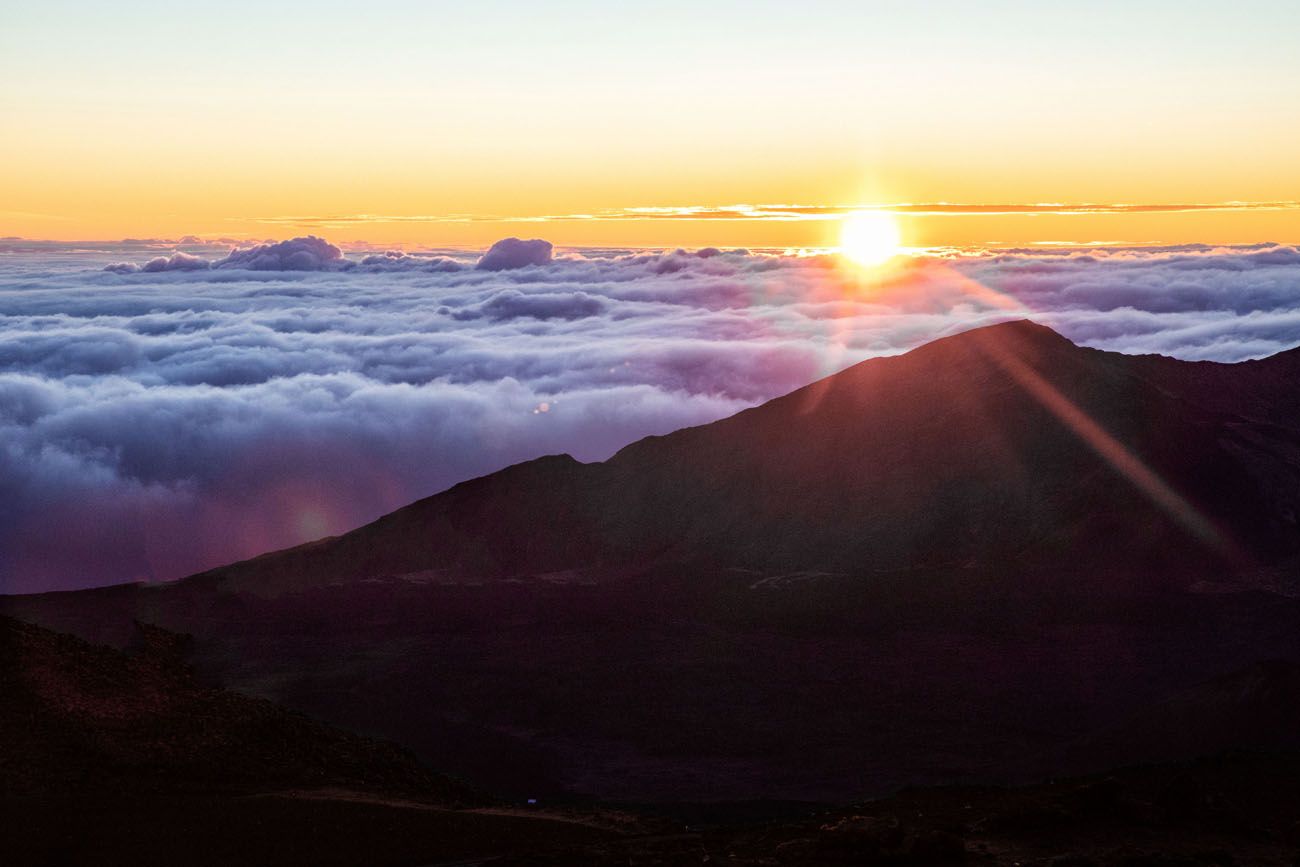
To do this, be prepared to wake up extremely early. From most locations on Maui, it takes about 2 hours to drive to the summit of Haleakala. If sunrise is at 6 am, plan on leaving your hotel before 4 am. I know you are on vacation, but it is worth setting your alarm clock to see this sunrise.
Be aware that the weather does not always cooperate. Sometimes the entire summit can be clouded in, so that view you woke up so early for just won’t be there. Or, there could be no clouds at all.
On the summit, there are several places to go to watch the sunrise. The most popular spot is on Pu’u‘ula‘ula (Red Hill), the highest point on Haleakala. You can either stand outside of the Summit Observation Deck or on the opposite hillside next to the parking lot.
For sunrise times during your visit, click here.
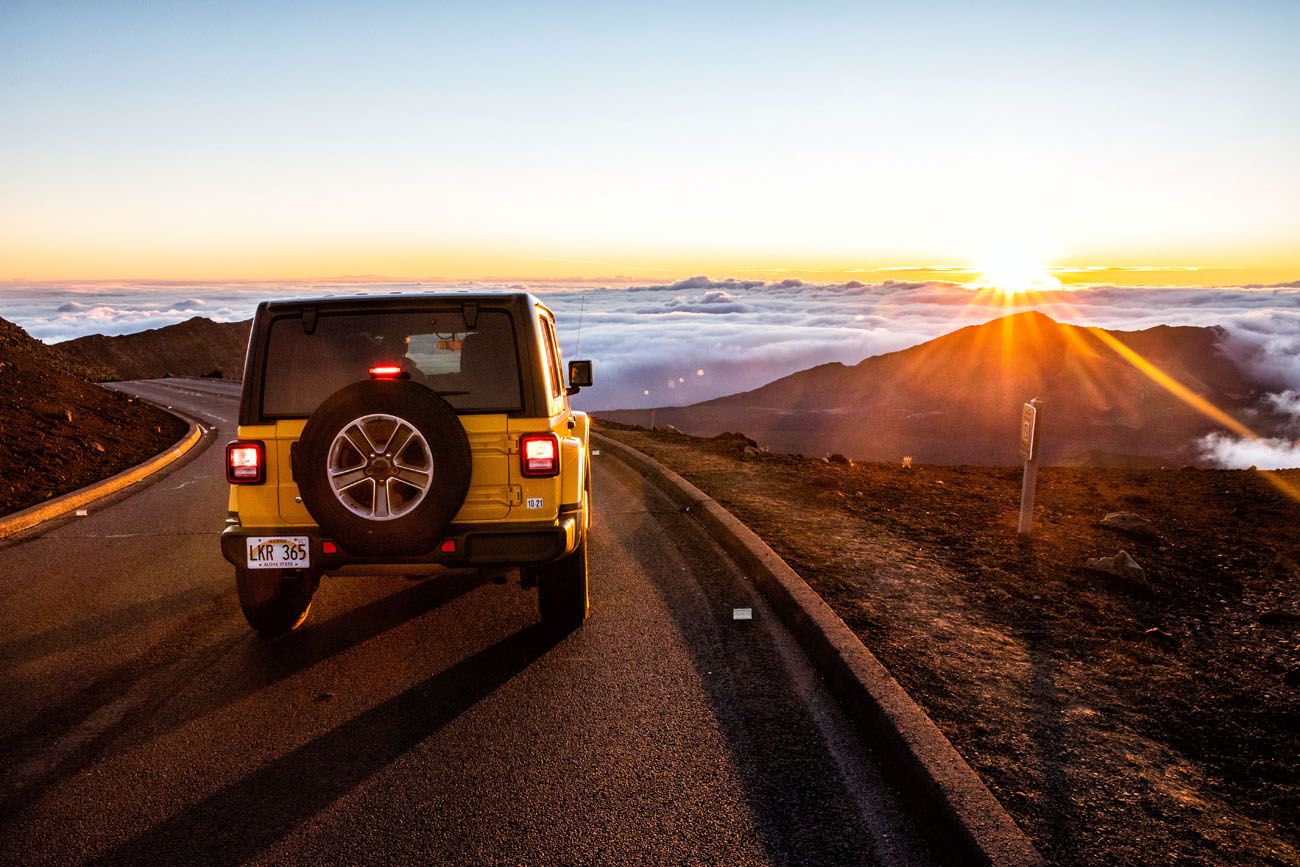
Another sunrise view as we drove from Red Hill to the visitor center.
Sunrise Reservations
In order to do this, you need to make your reservation in advance. This is such a popular experience that the National Park Service now requires an advance reservation to avoid overcrowding at the summit. These reservations allow you to enter the park between the hours of 3 am to 7 am.
If you do not have an advance reservation, you cannot enter the park until 7 am. From the park entrance, it takes another 30 minutes of driving to get to the summit.
Reservations can be made online up to 60 days in advance. The tickets are released at 7:00 am HST and usually sell out in 15 minutes. A second batch of tickets are released 48 hours in advance. You can only make your reservation online using the recreation.gov website. You cannot call to make your reservation or get one at the visitor center.
The ticket is free although there is a $1 reservation fee per ticket.
For more information about the reservation process, here is the link to the National Park Service website. And here is the link to make your reservation on the recreation.gov website.
If you are unable to get a reservation, you can either visit at sunset instead, or join a tour that includes sunrise on the summit.
If the idea of waking up super early to watch a sunrise is not the way you plan to spend your vacation, sunset is also fantastic. And there is no reservation necessary for this experience.
Haleakala National Park is one of the US National Parks that require an advance reservation. For the full list, read our guide to the US National Parks that Require an Advance Reservation.
2. Hike into the Haleakala Crater
Hiking into the crater is a must-have experience in Haleakala National Park. In fact, we liked this even more than watching the sunrise.
The Sliding Sands Trail, which is one of the most popular trails in the park, starts on the rim of Haleakala and ends on the crater floor. This is such a unique trail. As you descend into the crater, you walk on dusty, sandy trails through a landscape that looks like you are on Mars. Once in the crater, you can hike up hillsides and cinder cones for an even better view.
Most people hike part of the Sliding Sands Trail out-and-back. But if you want to cross the crater and hike up a different part of the rim, you can combine the Sliding Sands Trail with the Halemau’u Trail. This becomes an 11-mile point-to-point hike. It’s a long hike, and can be logistically challenging, but it’s worth it.
Sliding Sands Trail and Halemau’u Trail Loop | Stats, Photos & Tips
Everything you need to know to hike the Sliding Sands and Halemau’i Trail Loop.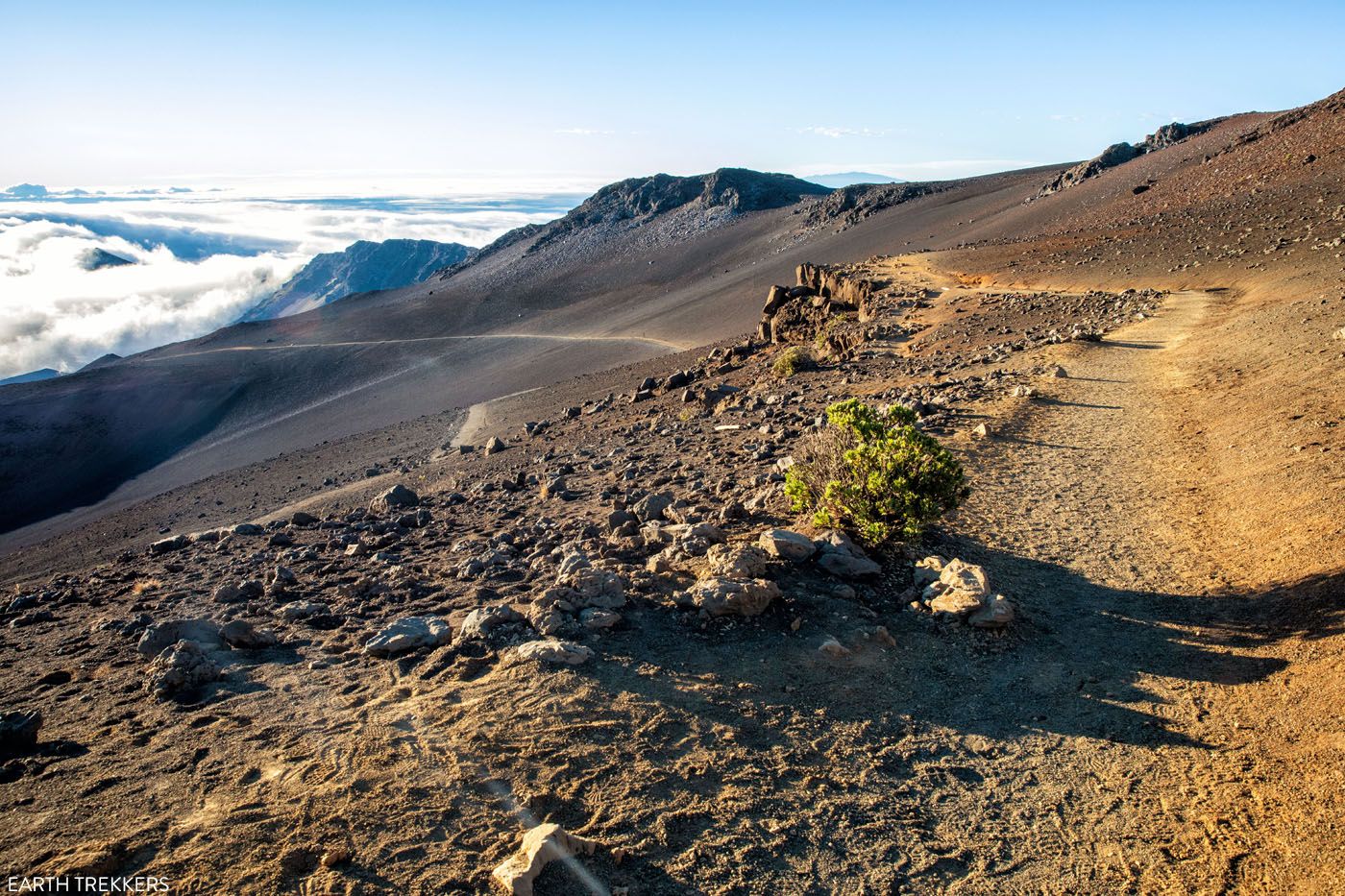
Sliding Sands Trail
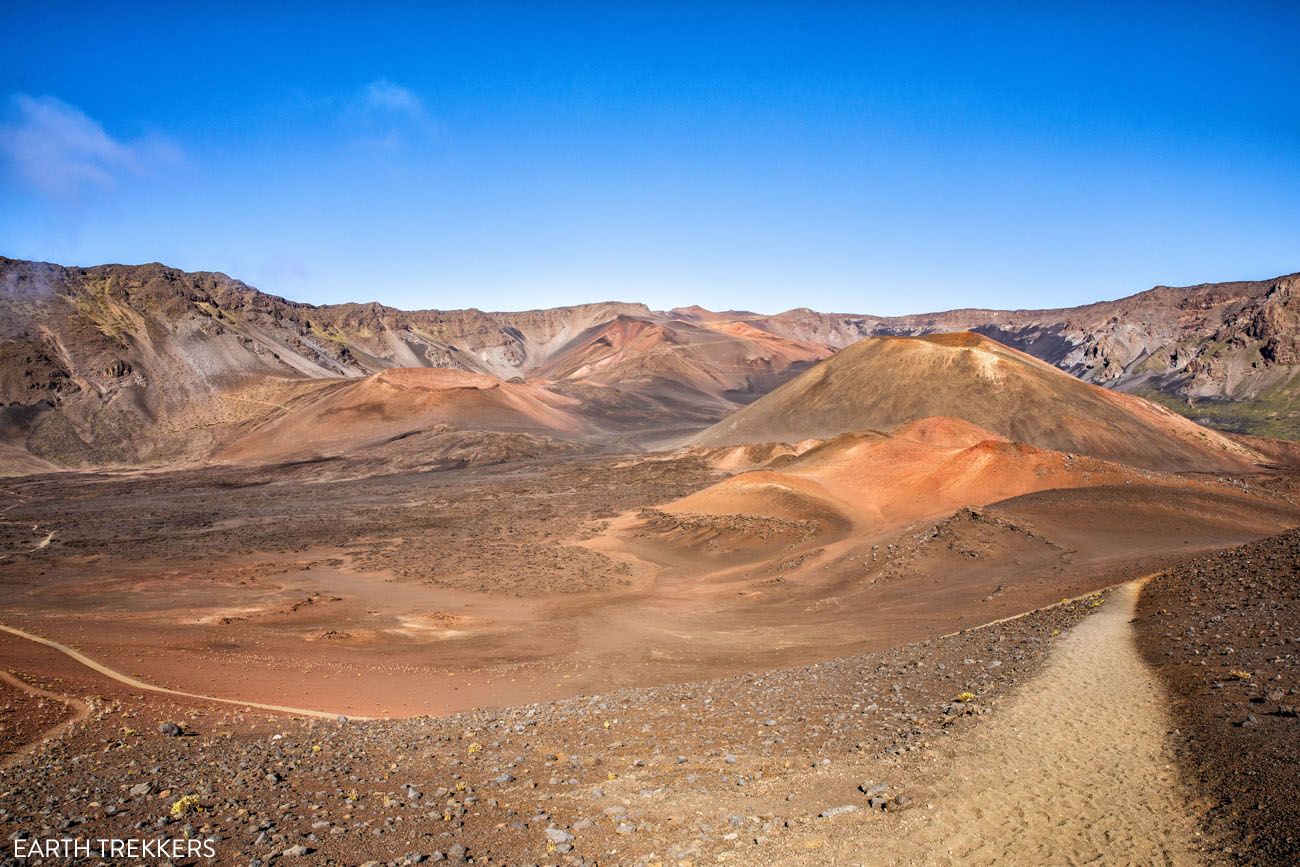
View of the Haleakala Crater from the trail
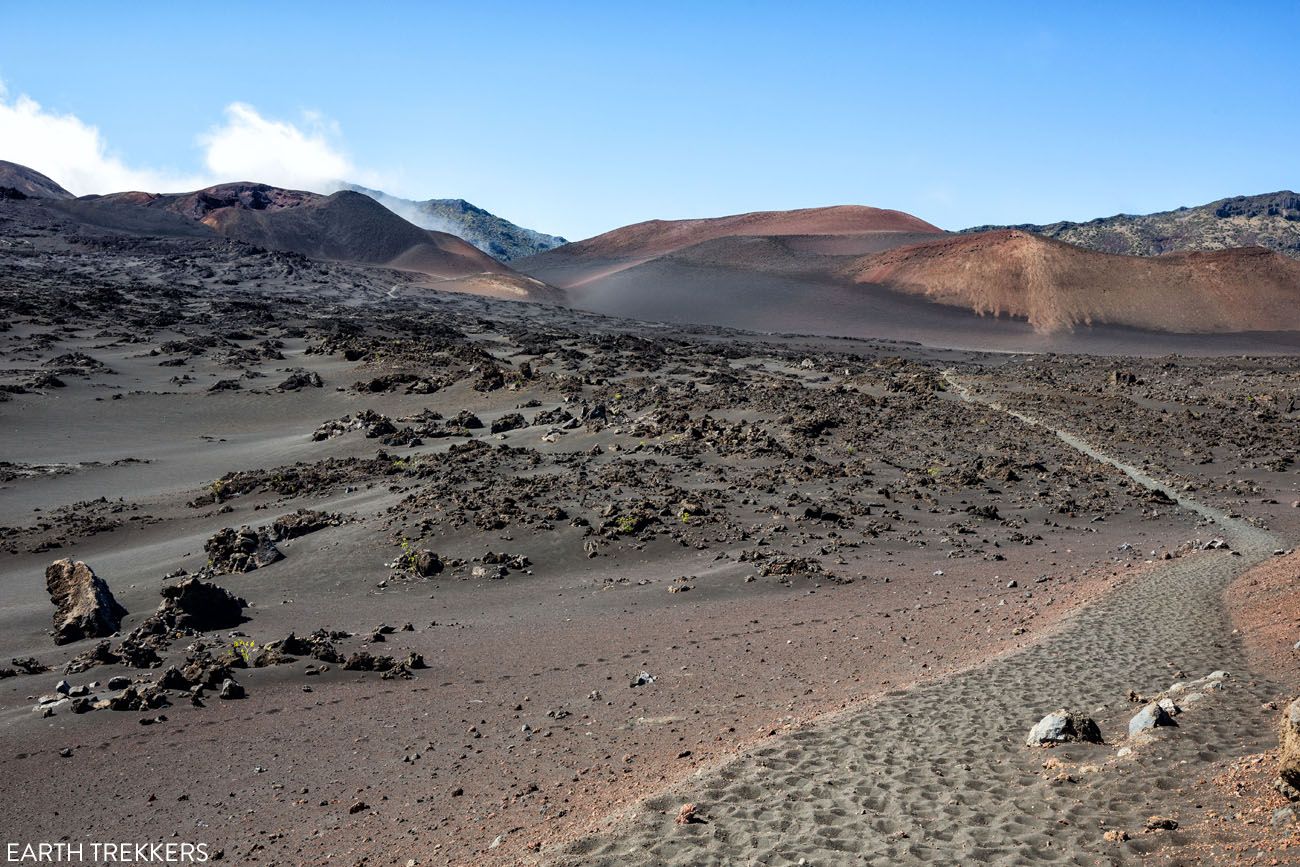
Another view of the crater
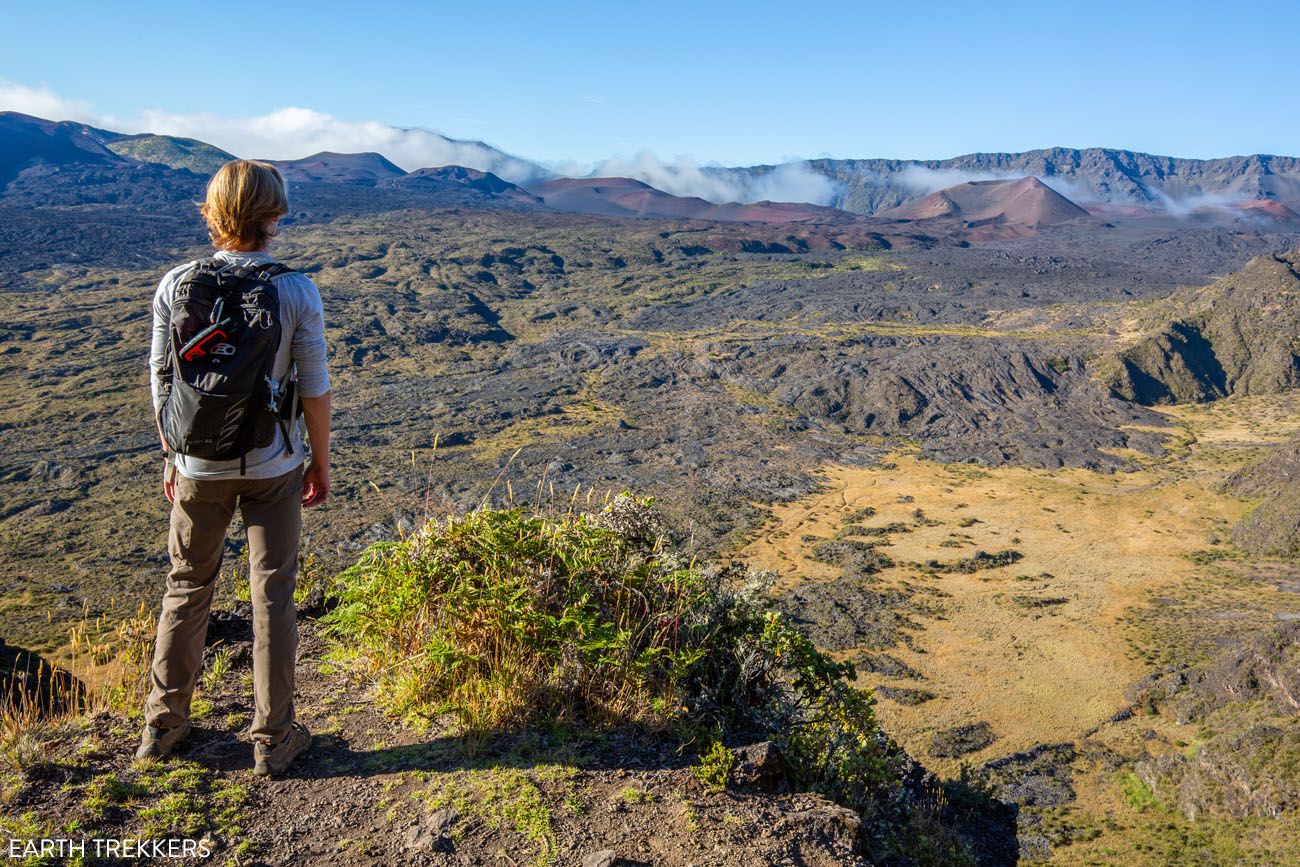
View of the Haleakala Crater from the Halemau’u Trail
If you have no desire to do an 11-mile hike, I highly recommend hiking a portion of the Sliding Sands Trail. To get to the crater rim floor, it is 4 miles one-way, or 8 miles round trip. For those who don’t want to go that far, consider hiking 2 miles down the Sliding Sands Trail. At the 2-mile point, you will have fantastic views of the Haleakala crater.
Please practice the seven principles of Leave No Trace: plan ahead, stay on the trail, pack out what you bring to the hiking trail, leave areas as you found them, minimize campfire impacts, be considerate of other hikers, and do not approach or feed wildlife.
3. See the Silverswords
Silverswords (‘ahinahina) are small, silvery plants that are only found on Haleakala on Maui and Mauna Kea and Mauna Loa on Hawaii. They are now endangered. Visitors once dug them up and took them home as souvenirs, and climate change is having an impact on them as well.
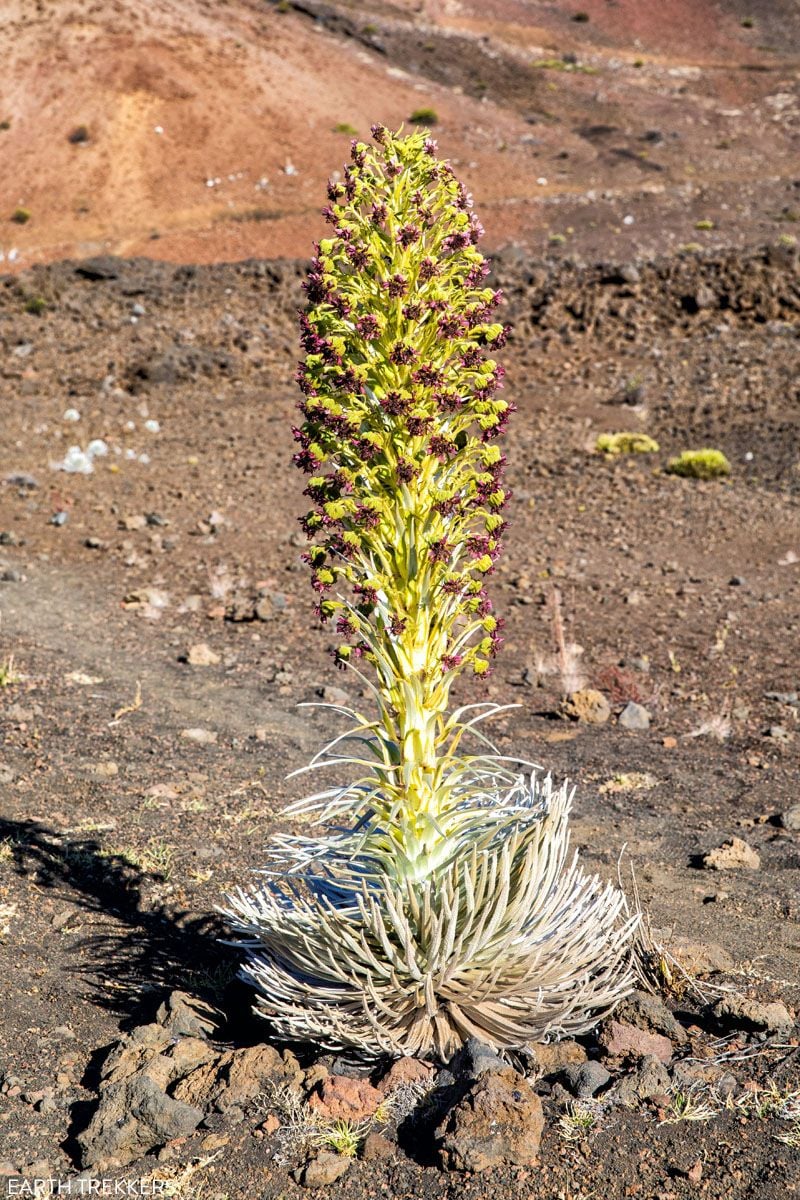
Silverswords can live up to 90 years. They bloom one time, sending up a beautiful stalk of flowers and seeds, dying soon afterwards. If you get to see one, you are extremely lucky!
One of the best places to see the silverswords is on the Sliding Sands Trail, between miles 2 and 3. Important! Please do not touch or disturb the silverswords or leave the trail to photograph them.
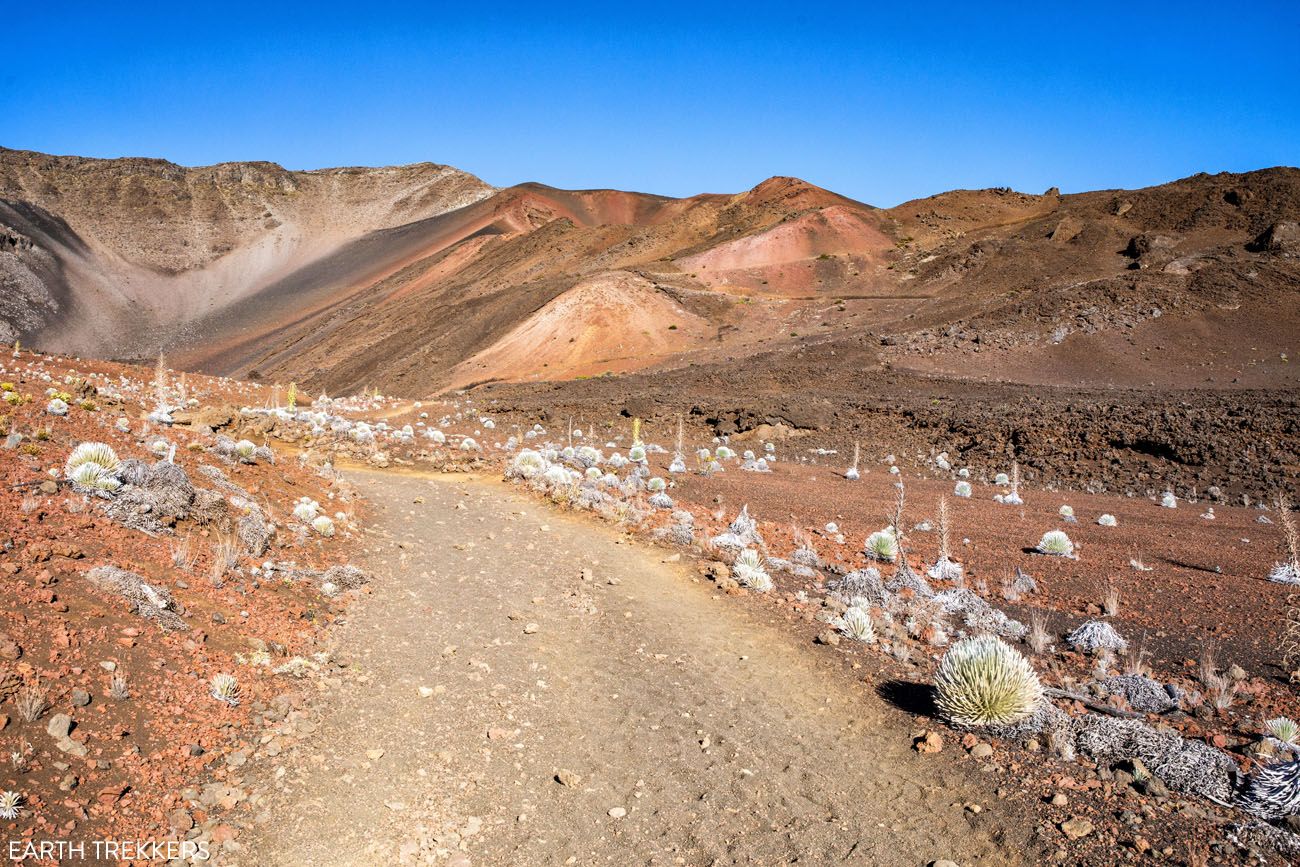
4. Backcountry Camping
If you like the idea of camping on the Haleakala Summit, you have several options.
Hōlua is located along the Halemau’u Trail. There is a campground here as well as a cabin.
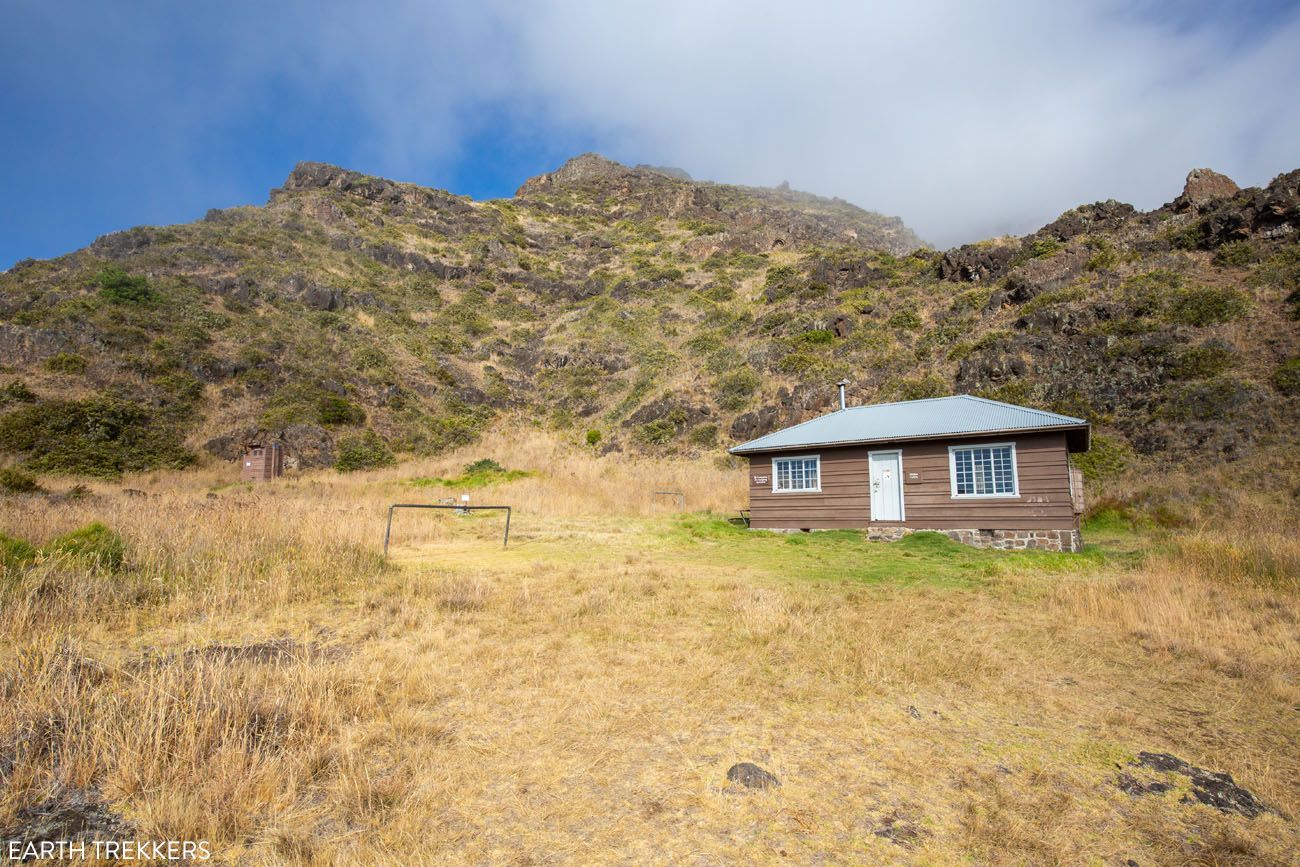
Hōlua Cabin
Palikū is located on the far eastern end of the crater. This area gets a fair amount of rain, so this part of Haleakala is green and lush. There is a campground here.
Kapalaoa Cabin is located at the 5.6 mile point on the Sliding Sands Trail.
Campsite and cabin reservations can be made 6 months in advance on recreation.gov. Learn more here.
5. Visit the Highest Point on Haleakala
Red Hill, also known as Pu’u‘ula‘ula, is the highest point on Haleakala and the island of Maui.
To get here from the visitor center parking lot, continue up Haleakala Highway and stay to the right to continue to the summit. Just before getting to the parking lot, there is usually a sign marking 10,000 feet of elevation. I say “usually” because it was knocked over when we were here. Hopefully the sign gets put back in place soon…it makes for a cool photo.
From the parking lot, you can walk up to the top of the hill. From here you get a great view looking northwest over Maui and a view of the crater.
You can also walk up to the Summit Observation Deck for another view of the crater and of the observatory.
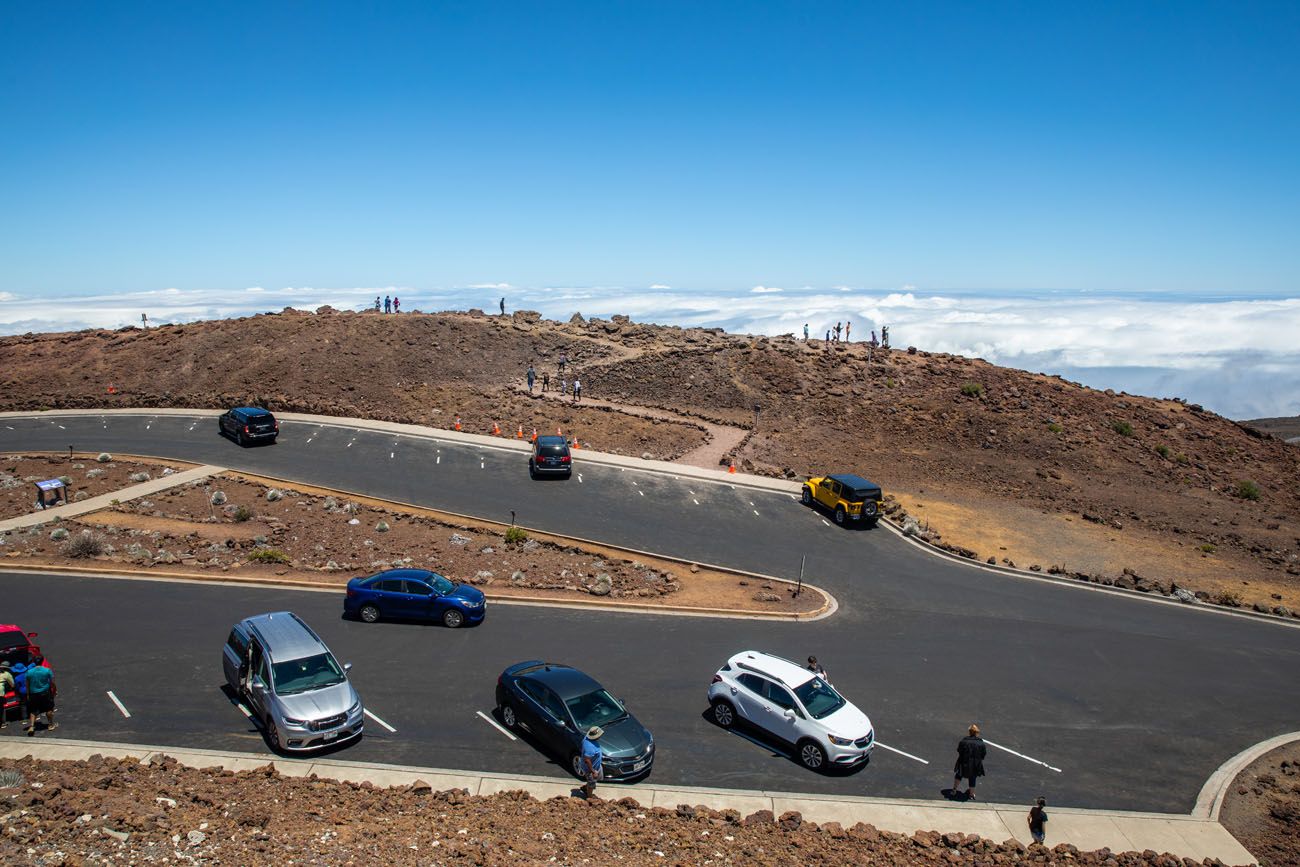
Red Hill parking lot
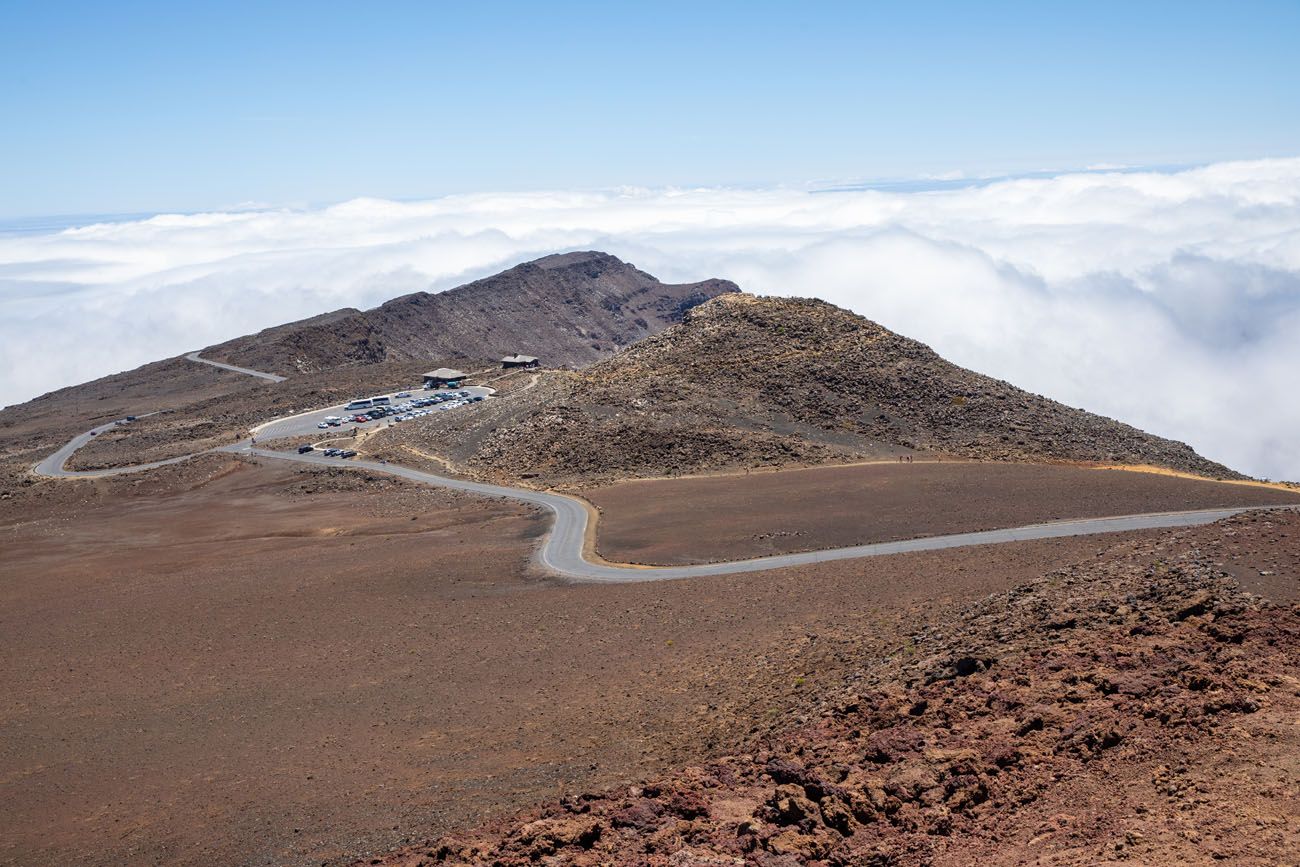
View of the Haleakala Visitor Center from Red Hill
On top of Haleakala is an astrophysical complex that is operated by the US Department of Defense, the Smithsonian Institution, the University of Hawaii, and others. This is one of the best places to view the night sky through a telescope, due to the elevation and clear weather conditions on Haleakala.
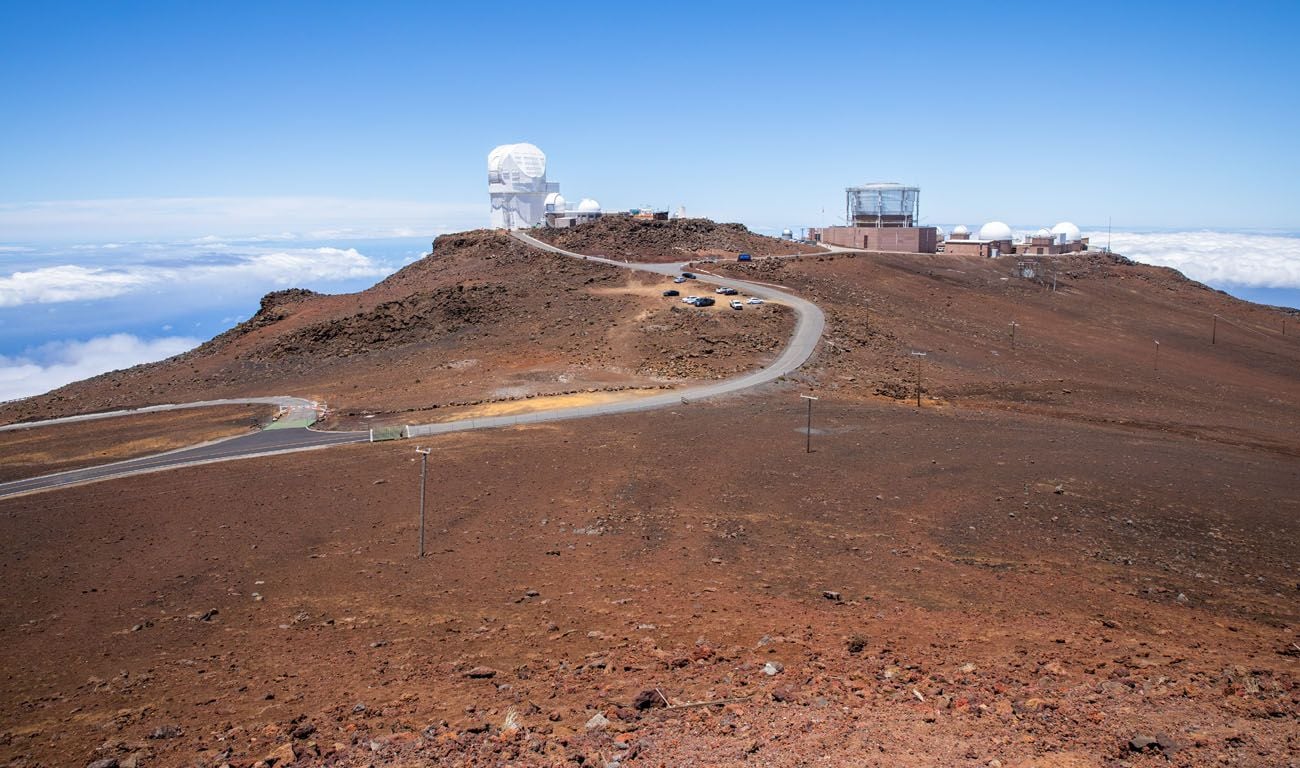
6. Go Stargazing
With little light pollution, clear skies, and its high elevation, Haleakala is a great place to view the night sky.
Dress warmly, bring some snacks or a picnic dinner, and a blanket or a chair to sit on. You can view the night sky from Red Hill, near the visitor center, or from a hiking trail (bring a headlamp!).
7. View the Crater from Pa Ka’oao
For a great view of the Haleakala crater, hike the short trail to Pa Ka’oao.
Starting next to the visitor center, it’s 0.4 miles round trip with 100 feet of elevation gain. You will hike up, and then down, over some very large steps and rocks. But it is worth it for the view.
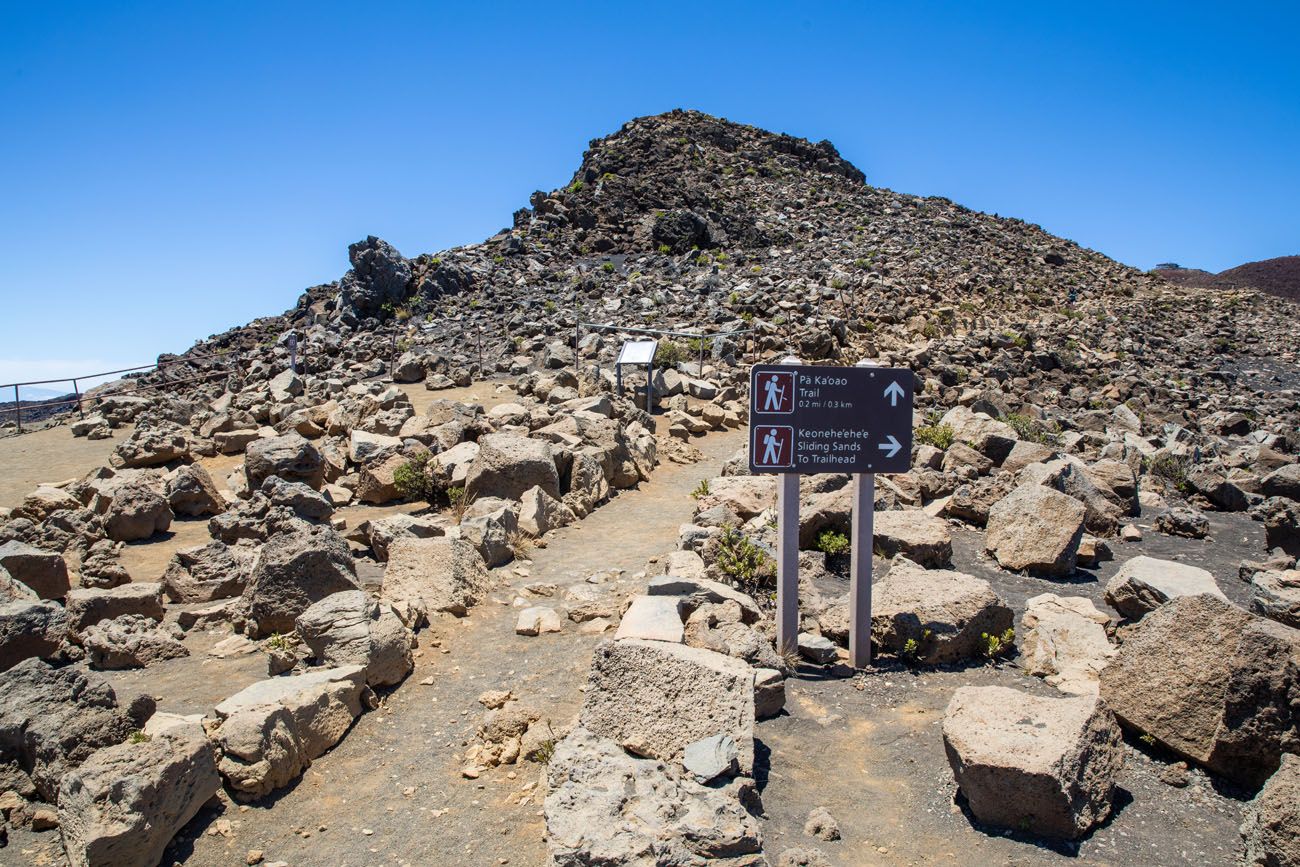
Pa Ka’oao Trail Haleakala
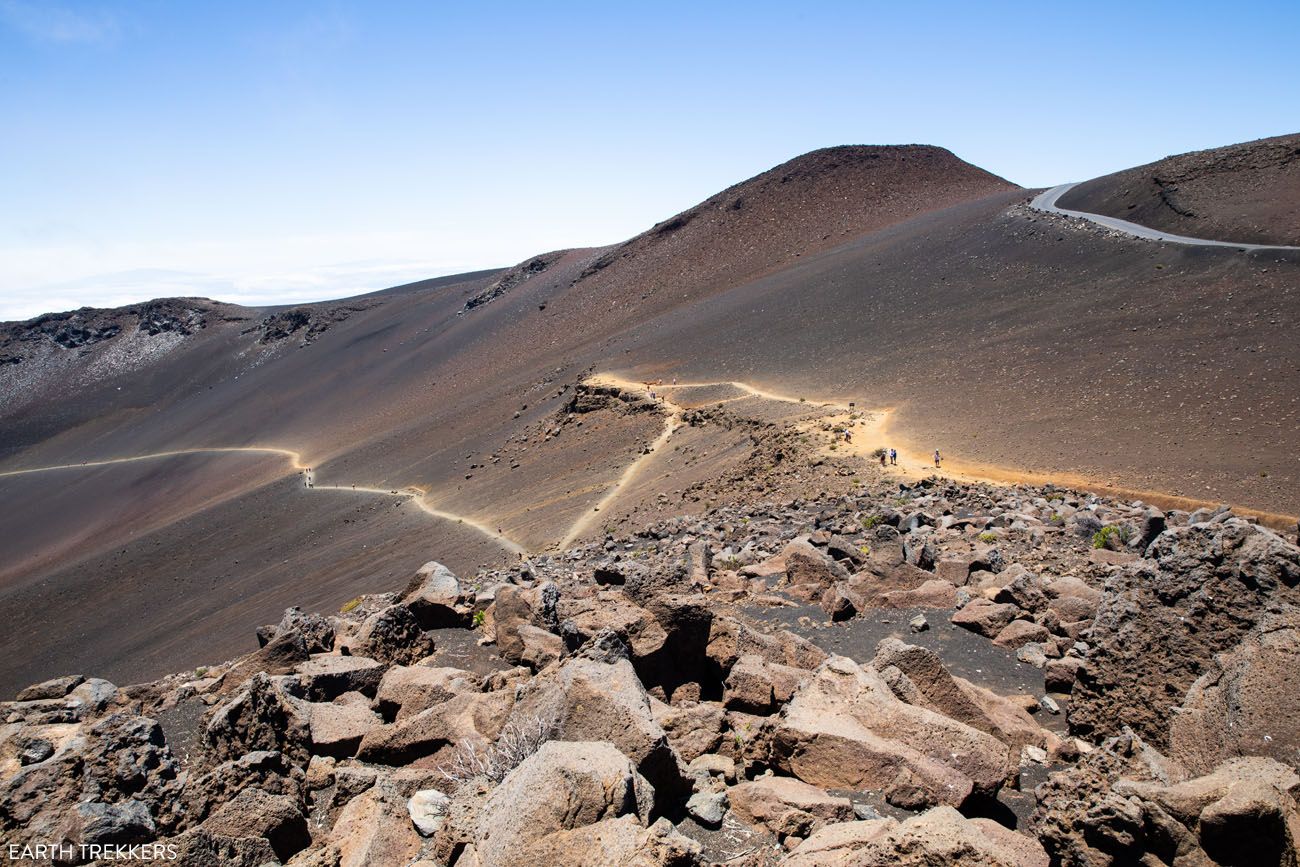
View of the Sliding Sands Trail from the Pa Ka’oao Trail
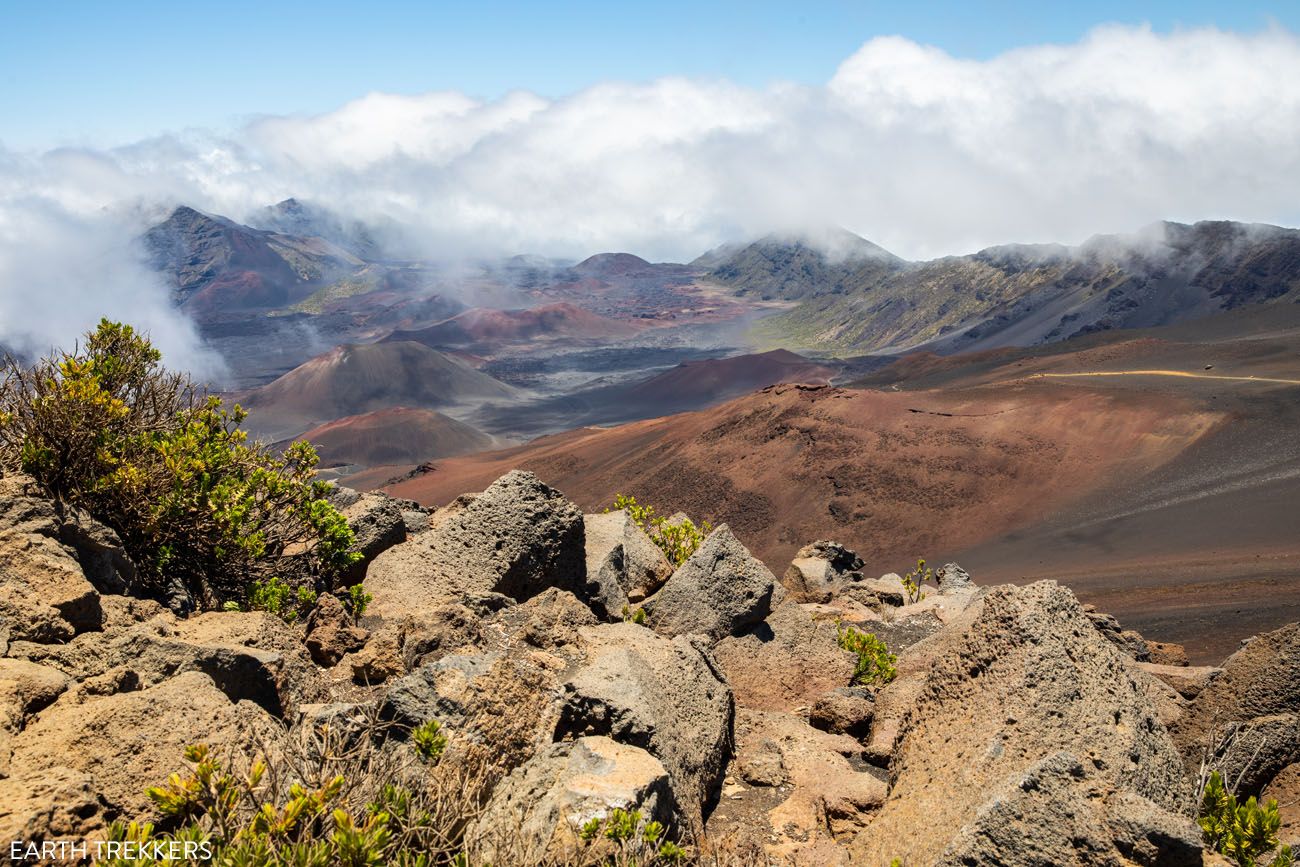
Pa Ka’oao Overlook
8. Kalahaku Overlook
For another great view of the Haleakala crater, visit the Kalahaku Overlook.
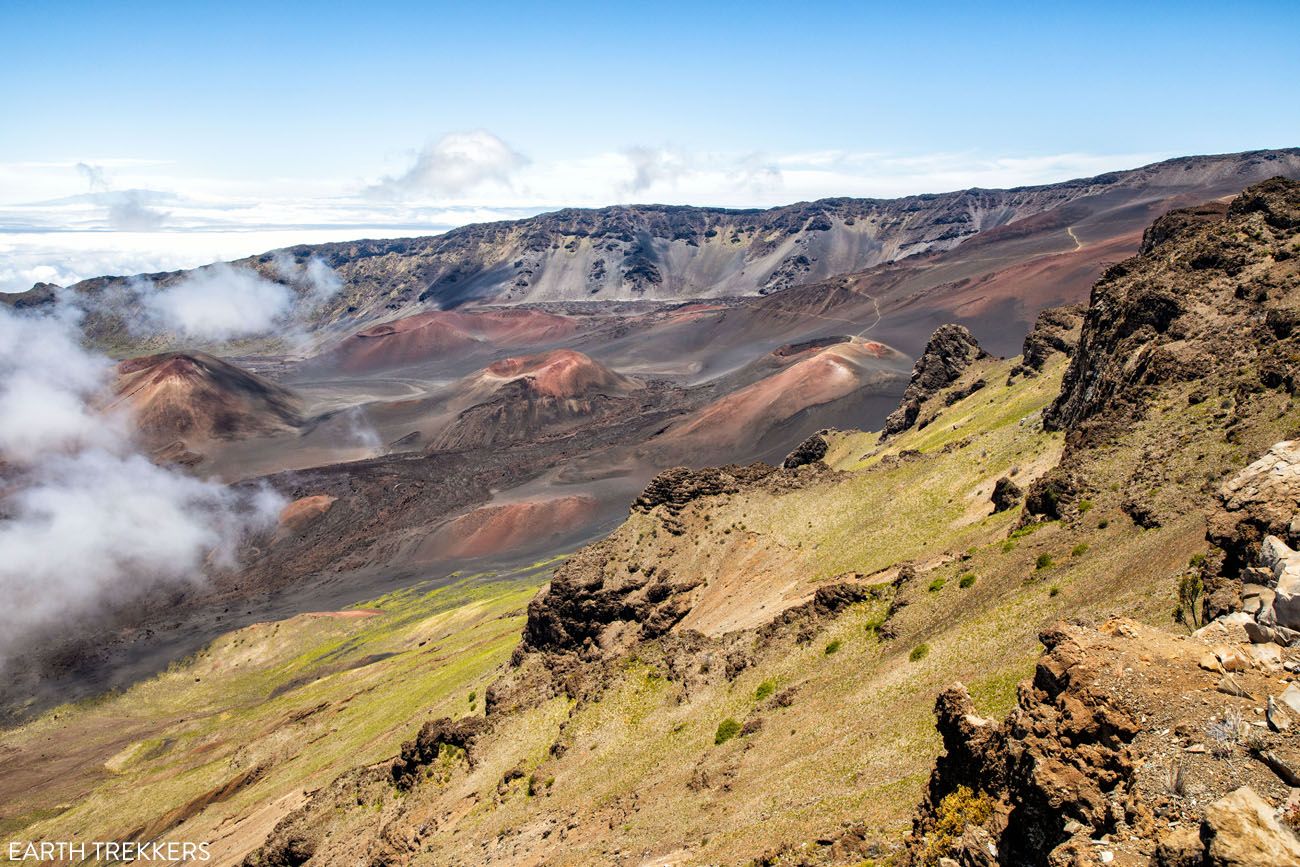
This overlook is located on Haleakala Highway, on one of the switchbacks below the summit. From the parking lot, it’s a short uphill walk to the viewpoint.
And even the parking lot can make an interesting photo spot.
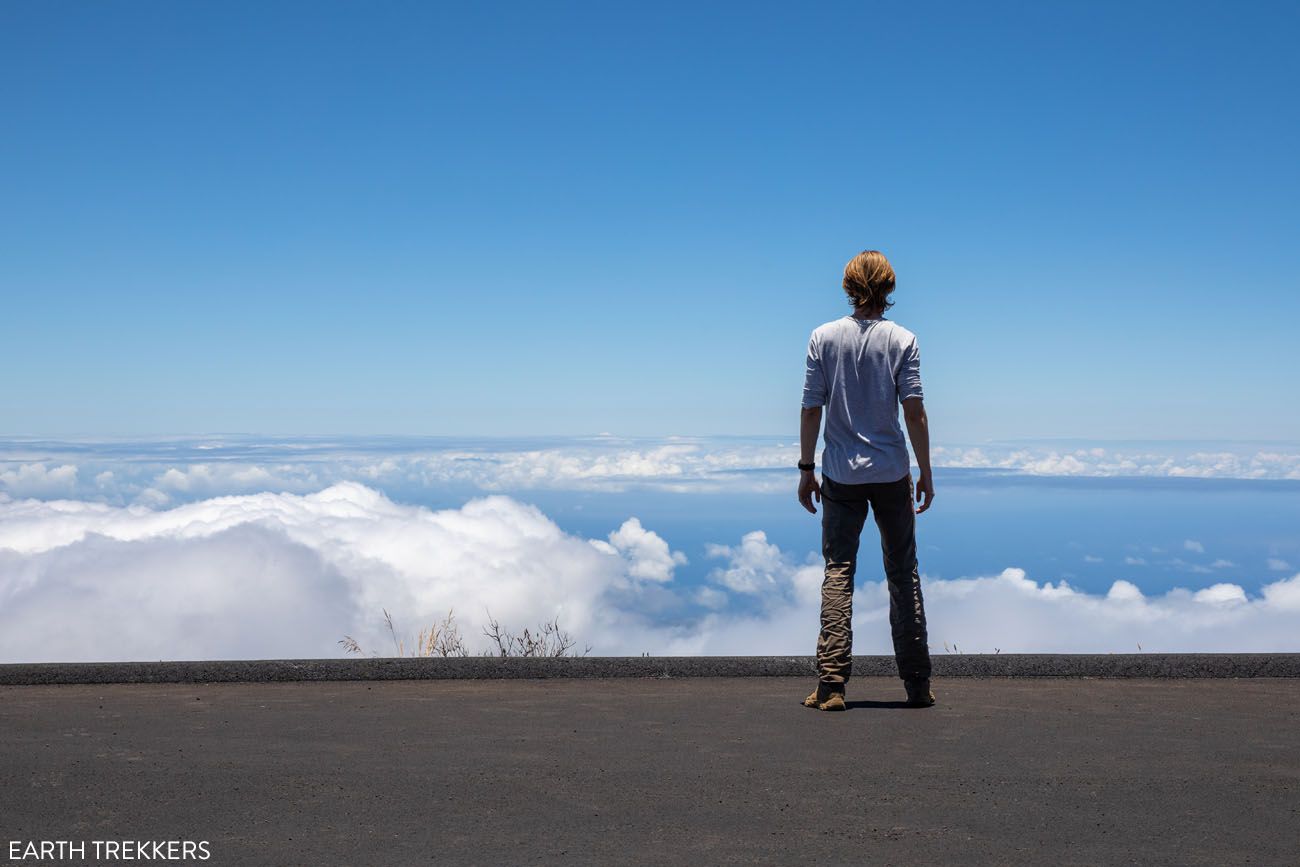
9. Leleiwi Overlook
This overlook is also located on Haleakala Highway, two switchbacks below the Kalahaku Overlook.
It is a 0.3 mile round trip walk to the overlook from the parking lot. From the overlook, you will have a view of the crater and the north shore of Maui. We did not do this, since this part of Haleakala was clouded in on our most recent visit.
10. Visit Hosmer Grove
Located at 7,000 feet, Hosmer Grove is considered part of the Summit District, although it is not located near the crater. Hosmer Grove is in the cloud belt of Haleakala. There are picnic areas here as well as a nature trail.
This is a good place to see nēnē, a native Hawaiian goose that is endangered, as well as other birds that are endemic to Hawaii.
11. Take a Bike Tour of Haleakala
Years ago, one of the most popular things to do in Haleakala National Park was to cruise from the summit to the base of Haleakala on a bike. After several tragic deaths on bike tours, the National Park Service put an end to this.
You can still ride a bike down Haleakala, but tour companies have to start outside of the park entrance.
The bike ride is 23-miles long, starting outside of the park entrance and ending at the base of Haleakala. That means that you will not get to ride the top section of Haleakala Highway, where you get panoramic views of Maui.
Some bike companies, like Bike Maui, offer a guided tour where you watch the sunrise at the summit, and are then driven outside of the park entrance, at 6,500 feet, where you then bike 23 miles to Haiku.
You are permitted to bike from the summit to the base of Haleakala, if you do this on your own. Some very fit people cycle to the top of Haleakala and then cruise back to their starting point. Cycling is permitted on Haleakala, it just can’t be done with a commercial tour group.
Things to Do in the Kīpahulu District
12. Hike the Pīpīwai Trail
On just one hike, you can see several waterfalls, an enormous Banyan tree, and hike through a bamboo forest.
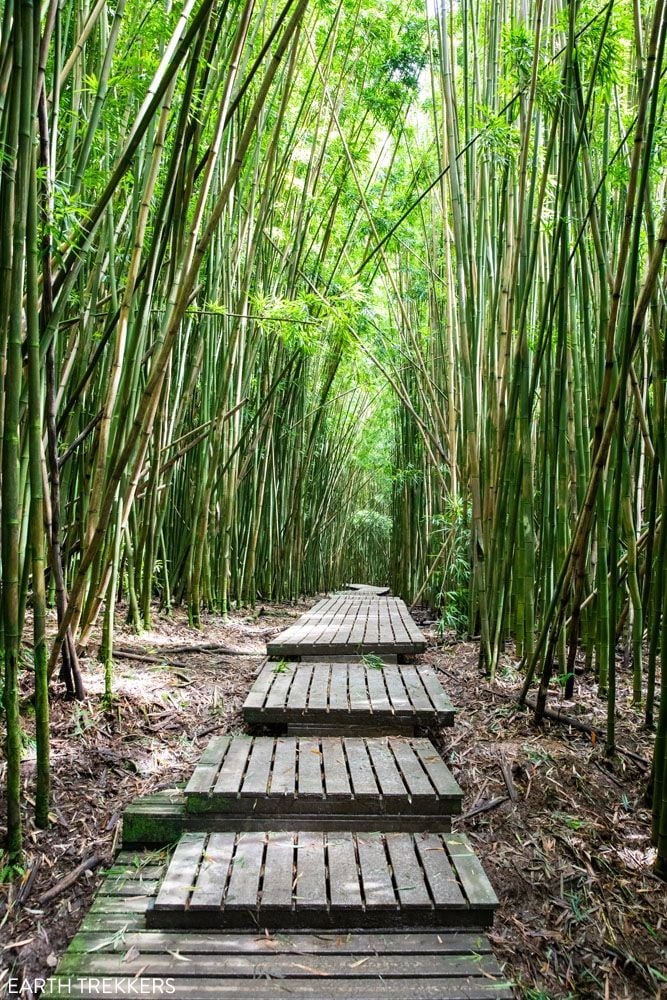
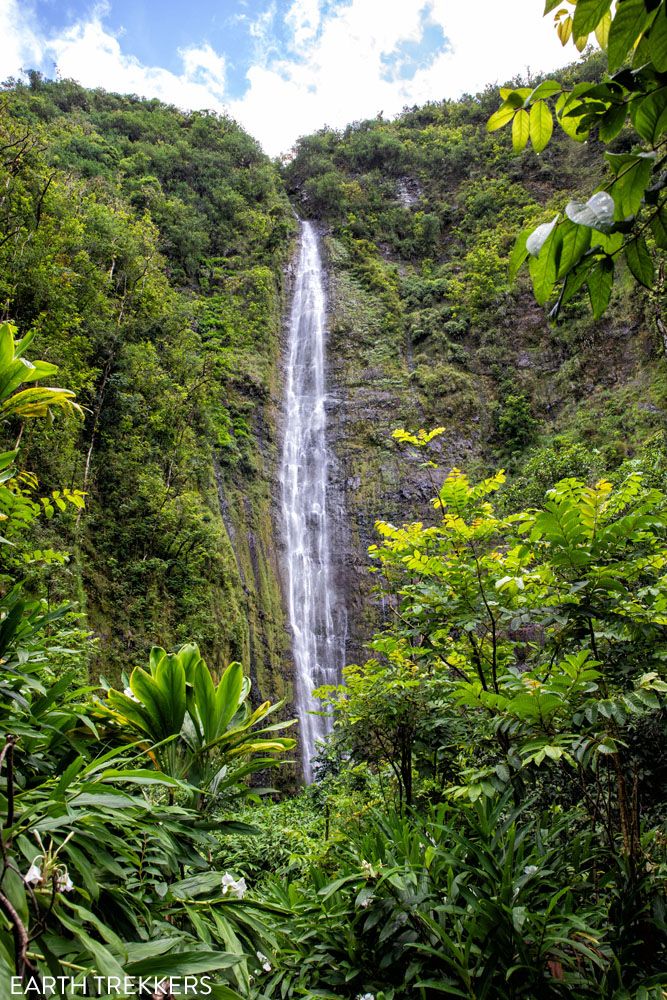
The Pīpīwai Trail is 3.8 miles round trip and moderately difficult. It can take between two to four hours, depending on how fast you hike and how often you stop for photos.
Pīpīwai Trail: A Step-By-Step Guide to One of Maui’s Best Hikes
How to hike the Pipiwai Trail: stats, trail guide, and photos.13. Visit the Seven Sacred Pools of ‘Ohe’o
The Seven Sacred Pools of ‘Ohe’o, also referred to as ‘Ohe’o Gulch, is a collection of cascading waterfalls and pools.
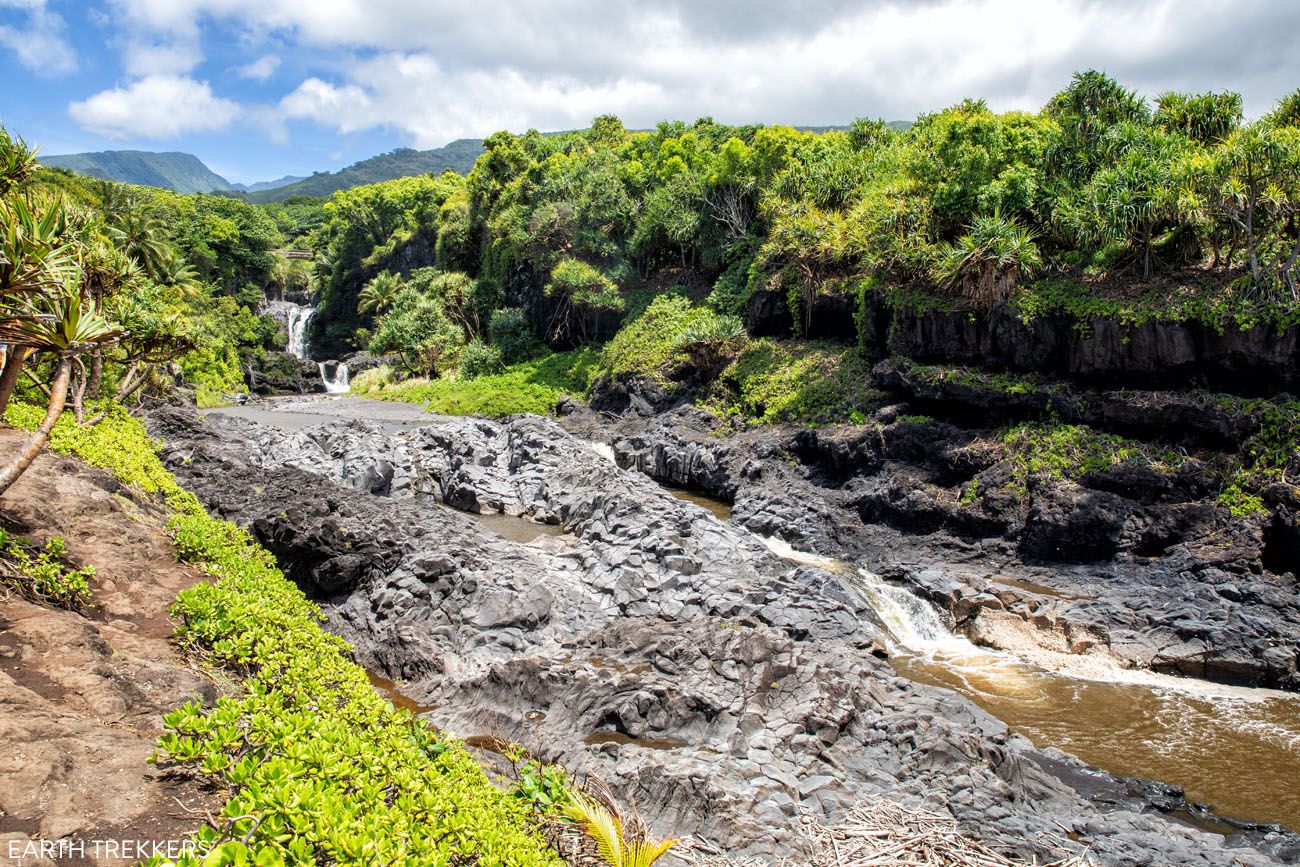
Swimming in these pools is a popular thing to do, but Ohe’o Gulch is frequently closed to swimming by the National Park Service. Rain at higher elevations can trigger flash floods, which can be very dangerous. The water can rise as much as 4 feet in a matter of minutes, washing people out to sea.
You can see ‘Ohe’o Gulch from the Kuloa Trail. This easy hike is 0.5 miles round trip and takes you to a few viewpoints of the pools.
You can get updates on whether or not the pools are open for swimming on the National Park Service website.
Things to Do in Haleakala National Park: On a Map
How to Use This Map: Click the icons on the map to get more information about each point of interest. To take this map with you, click the star next to the title of the map which adds it to your Google account. Next, within your Google Maps app, select ‘Saved’ and then select ‘Maps’. This map title will now appear in your list.
How Much Time Do You Need in Haleakala National Park?
If you want to visit the summit and the Kīpahulu District, you will need a minimum of two days in Haleakala National Park.
With one day in Haleakala National Park, you will have to choose between visiting the summit and visiting the Kīpahulu District. The distance and driving time between these two areas is so great that you cannot visit both on the same day. No road connects the summit to the Kīpahulu District.
With two days in Haleakala National Park, spend one day on the summit and one day in the Kīpahulu district. On day one, watch the sunrise (don’t forget to make your reservation in advance!), hike the Sliding Sands Trail, and visit the crater overlooks. On day 2, visit the Kīpahulu District. This is one of the best things to do on the Road to Hana.
If you want to camp in the backcountry, plan on spending a minimum of three days in Haleakala National Park.
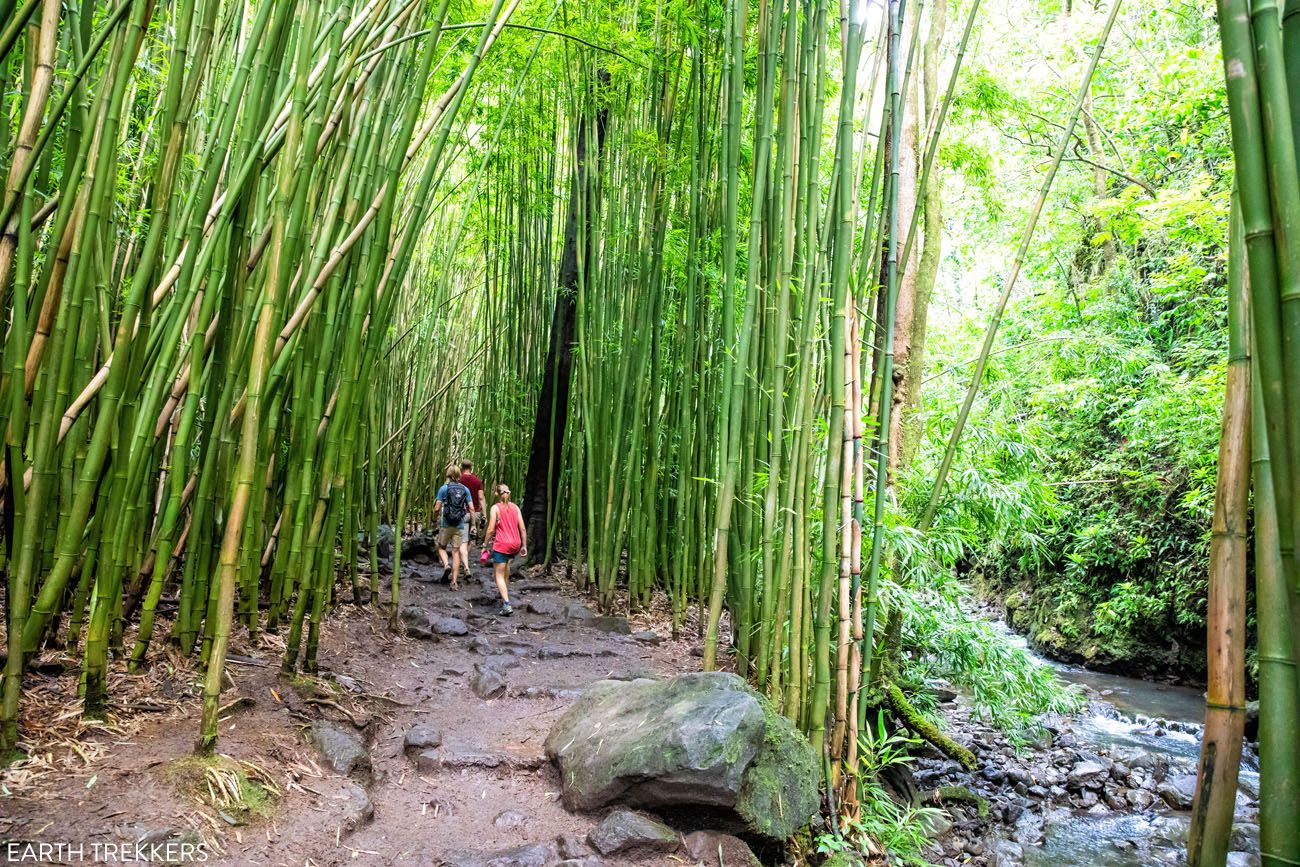
Pīpīwai Trail
Best Time to Visit Haleakala National Park
Haleakala National Park can be visited all year. November through April is the wet season, so expect more rainfall during these months. The weather is drier from May through October, both on the summit and at the Kīpahulu District. Crowds are their largest during the summer months.
For drier weather and lower crowds, the best time to visit Haleakala National Park is in May, September, and October.
How to Get to Haleakala National Park
The Summit District
To get to the Haleakala summit, it takes between 1.5 and 3 hours to drive here.
Here are the driving distances and times from other locations in Maui:
- Lahaina: 60 miles, 1.75 hours
- Ka’anapali: 64 miles, 1.75 hours
- Kihei: 45 miles, 1.25 hours
- Wailea: 50 miles, 1.5 hours
- Kahului: 38 miles, 1.25 hours
- Hana: 70 miles, 3 hours
The Haleakala Highway is very windy. Even though it is only 21 miles to the summit on this road, it can take an hour to do this part of the drive, due to the winding nature of the road. If you suffer from motion sickness, I recommend taking Dramamine before starting this drive.
The park entrance gate is located just before Hosmer Grove. This is where you will show your sunrise entrance ticket before driving to the summit.
Note: There is no public transportation to the park or within the park. There also is not a road that connects the Summit District to the Kīpahulu District.
Kīpahulu District
Via the Road to Hana
The Kīpahulu District is located in southeast Maui and it is one of the main attractions on the Road to Hana.
Here are driving distances and times from other locations in Maui, via the Road to Hana (these times do not take in account any additional time for stops along the way):
- Hana: 11 miles, 40 minutes
- Lahaina: 84 miles, 3.5 hours
- Ka’anapali: 89 miles, 3.75 hours
- Kihei: 70 miles, 3 hours
- Wailea: 76 miles, 3.25 hours
- Kahului: 63 miles, 3 hours
Via Highway 37
Alternatively, you can drive Highway 37 along the south coast to get to the Kīpahulu District. This gets you here quicker, but it is a more rugged, remote road than Highway 360 (the Hana Highway). This road is also referred to as the Back Road to Hana or the Backside of Haleakala.
We did this and it’s a beautiful drive. The road is not nearly as bad as other sources make it out to be. There are a few short sections of unpaved road and several sections of extremely rough paved road, but regular cars will do just fine. The road is narrow with one lane bridges, but in that respect it’s similar to the Road to Hana. Just note that you could be violating the terms of your rental car agreement if you drive Highway 360.
Here are the driving distances and times from other locations in Maui, via Highway 360 (these times do not take in account any additional time for stops along the way):
- Lahaina: 74 miles, 2.5 hours
- Ka’anapali: 79 miles, 2.75 hours
- Kihei: 60 miles, 2 hours
- Wailea: 66 miles, 2.25 hours
- Kahului: 53 miles, 2 hours
Best Way to Drive the Road to Hana & is It Worth It?
A complete guide to the Road to Hana.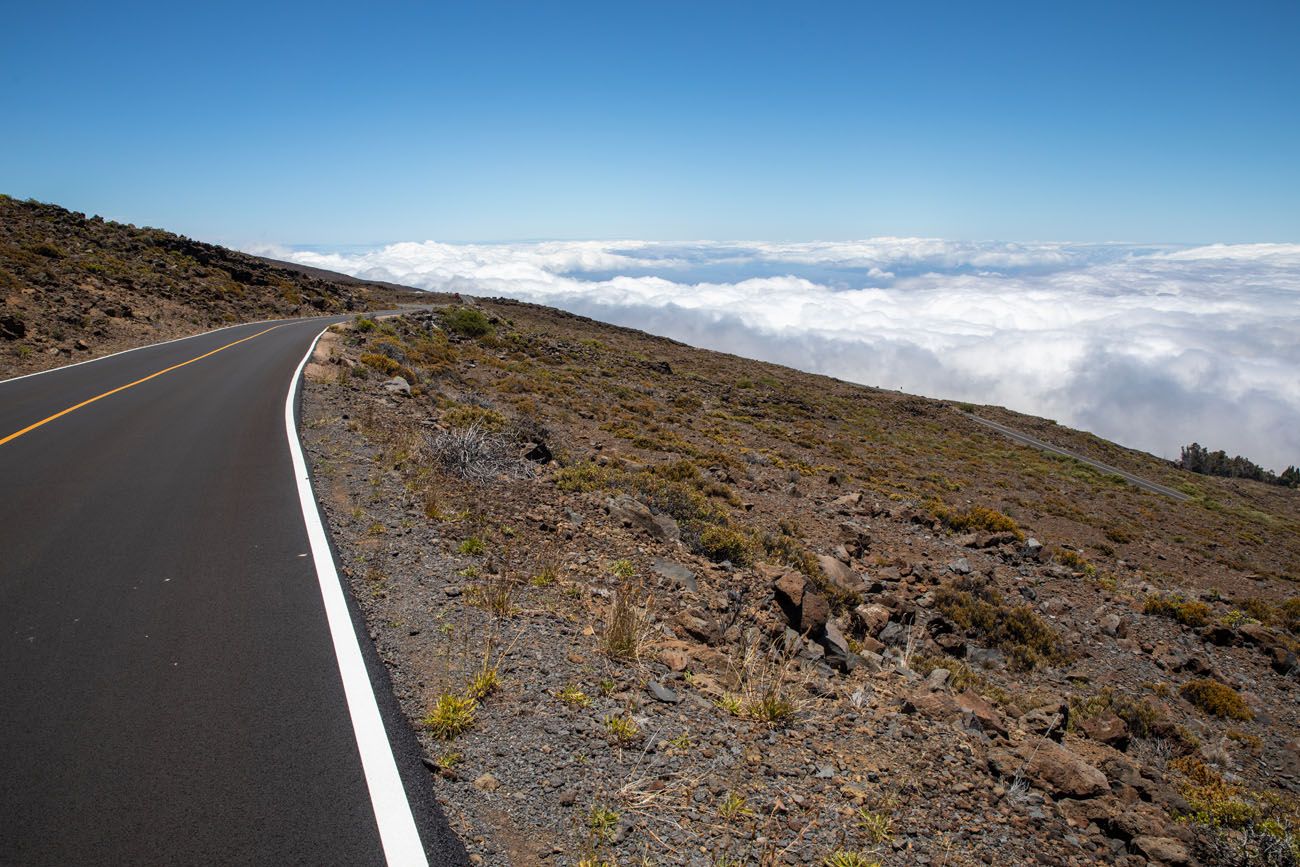
Haleakala Highway
Tips to Have the Best Experience
Don’t forget to make your Haleakala Sunrise Reservation in advance. If you are unable to get a reservation, you can either visit at sunset instead, or join a tour that includes sunrise on the summit.
Dress warmly if you plan to visit the summit at sunrise or sunset. Temperatures at sunrise can be downright cold, even in the summer (temperatures can be in the 30’s or 40’s). We wore long pants, a long-sleeve shirt, fleece, and a rain jacket and felt comfortable. You can even consider bringing a hat and gloves.
Pack a picnic lunch. There are no restaurants in either the Summit District or the Kīpahulu District of Haleakala National Park.
There is limited parking at the Kīpahulu District. If the parking lot is full, you will not be permitted to enter the park. You will wait in line in front of the entrance gate until a space becomes available. There is no parking along Hana Highway. To avoid waiting in line, try to plan your arrival by 10 am.
Cellular Service. Free WiFi is not provided by the National Park Service. We use Verizon. On the summit, we had decent cellular service near the visitor center, but once on the Sliding Sand Trail and Halemau’u Trails we had no cellular service. We also did not have cellular service in the Kīpahulu District.
Tours of Haleakala National Park. If you do not have a sunrise reservation, have no plans to rent a car while in Maui, or prefer to visit the park with an experienced guide, here are a few highly rated tours of Halaeakala National Park.
Plan Your Visit
Entrance Fee: $30 per private vehicle, valid for 3 days. This entrance fee is valid for both the Summit District and the Kīpahulu District. The America the Beautiful Pass, the Hawai’i Tri-Park Annual Pass, the Interagency Senior Pass, and the Annual Pass for US Military are also accepted.
Park Hours: The summit is open 24 hours a day, 365 days per year. To access the summit between 3 am and 7 am, you must have a Haleakala Sunrise Reservation.
Get updates on road conditions and trail closures, as you plan your trip and just before your visit, on the National Park Service website.
If you have any questions about the best things to do in Haleakala National Park, let us know in the comment section below.
More Information for Your Trip to Hawaii
Read all of our articles about Hawaii in our Hawaii Travel Guide and the United States in our United States Travel Guide.
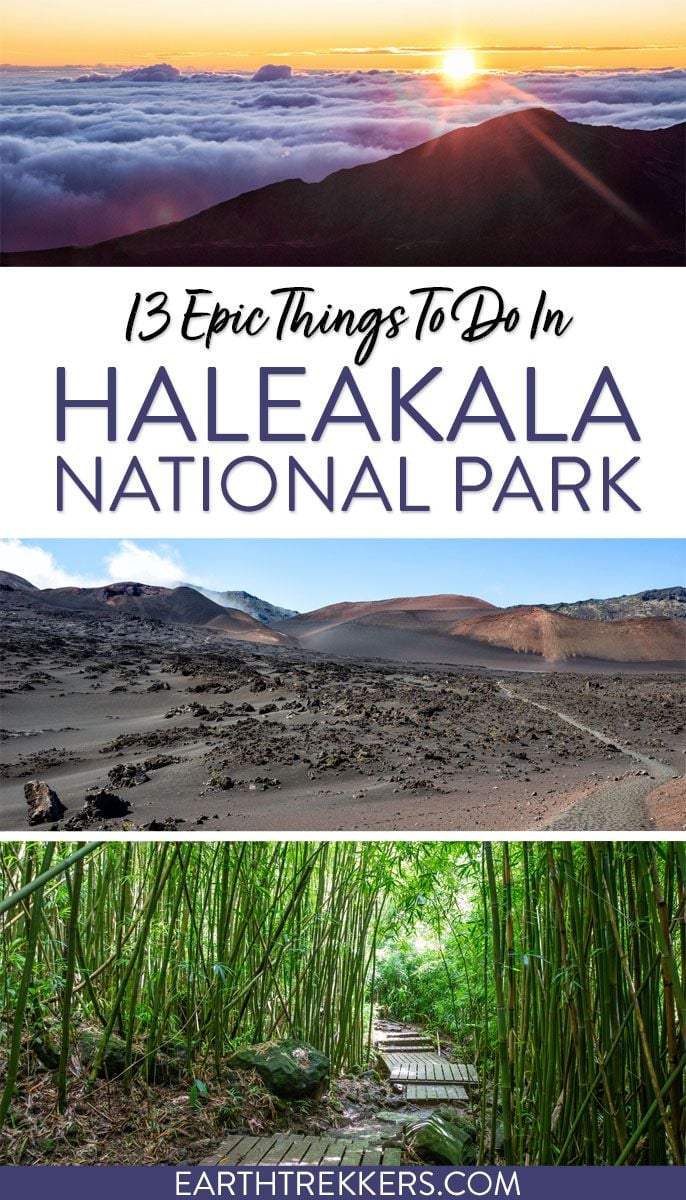
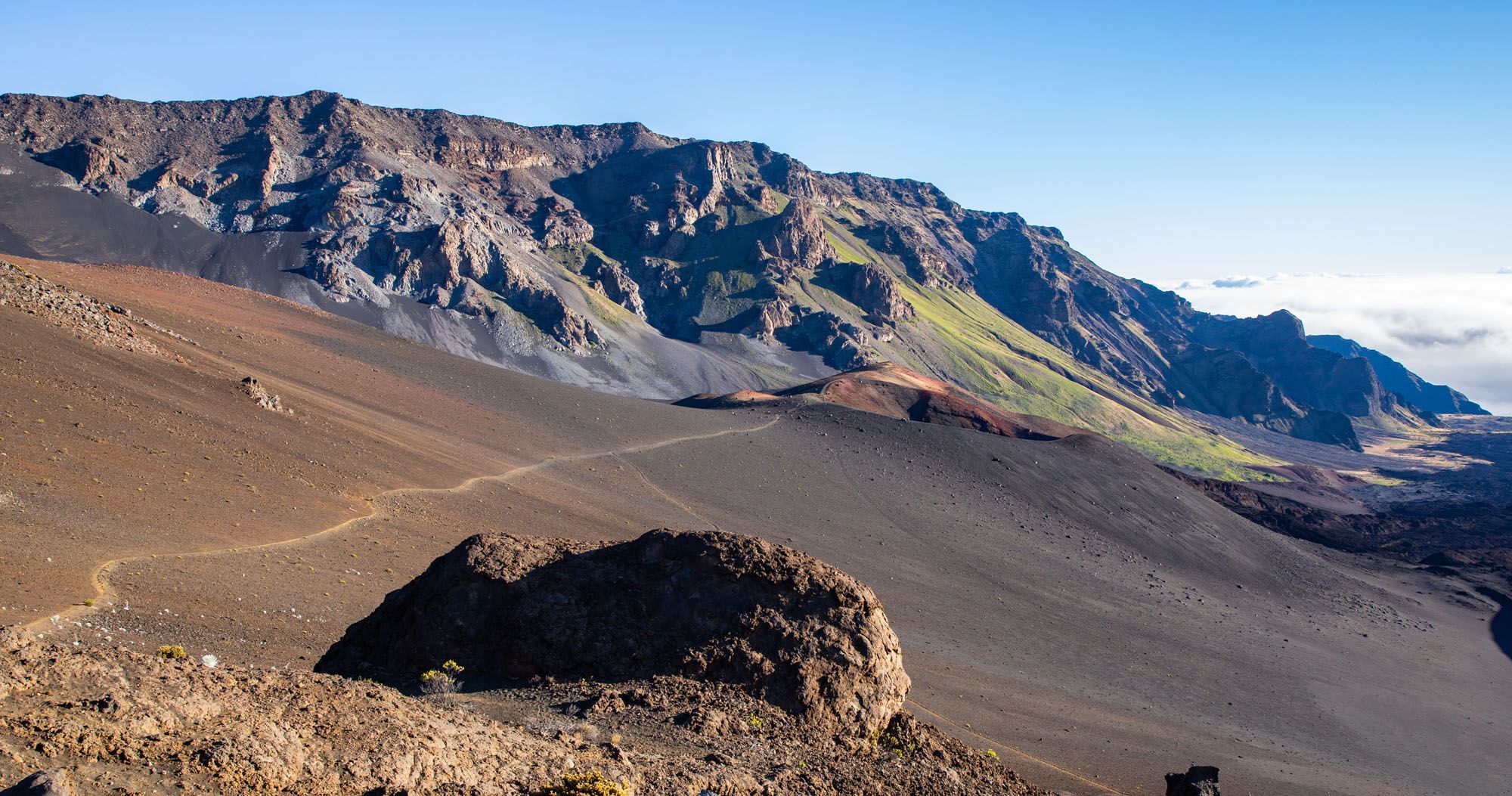
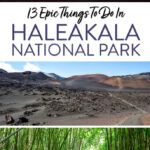
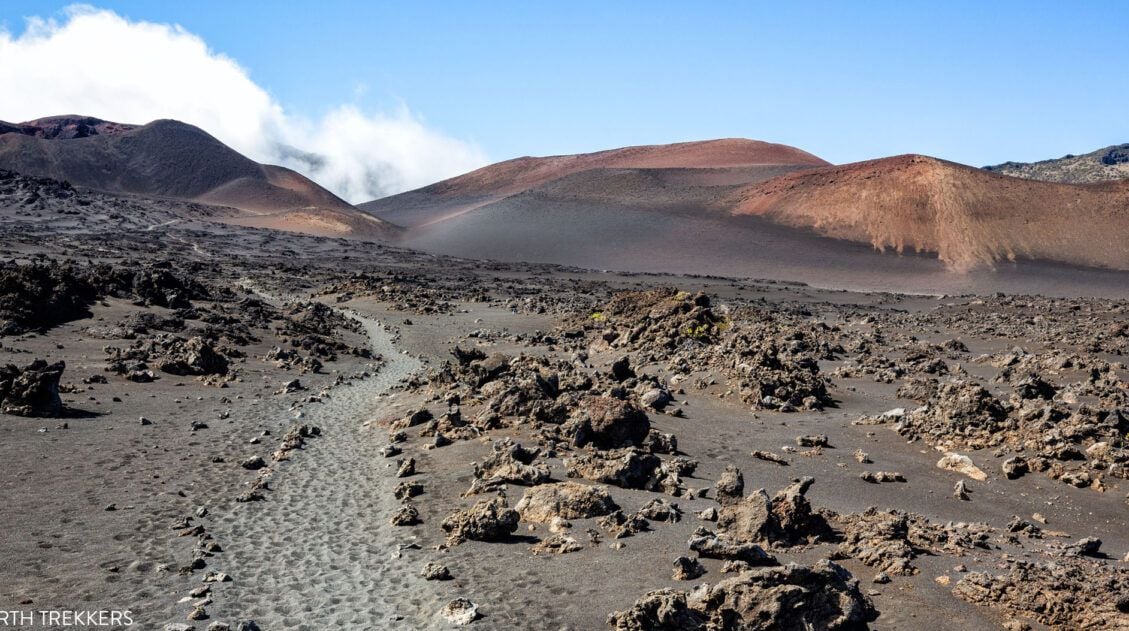
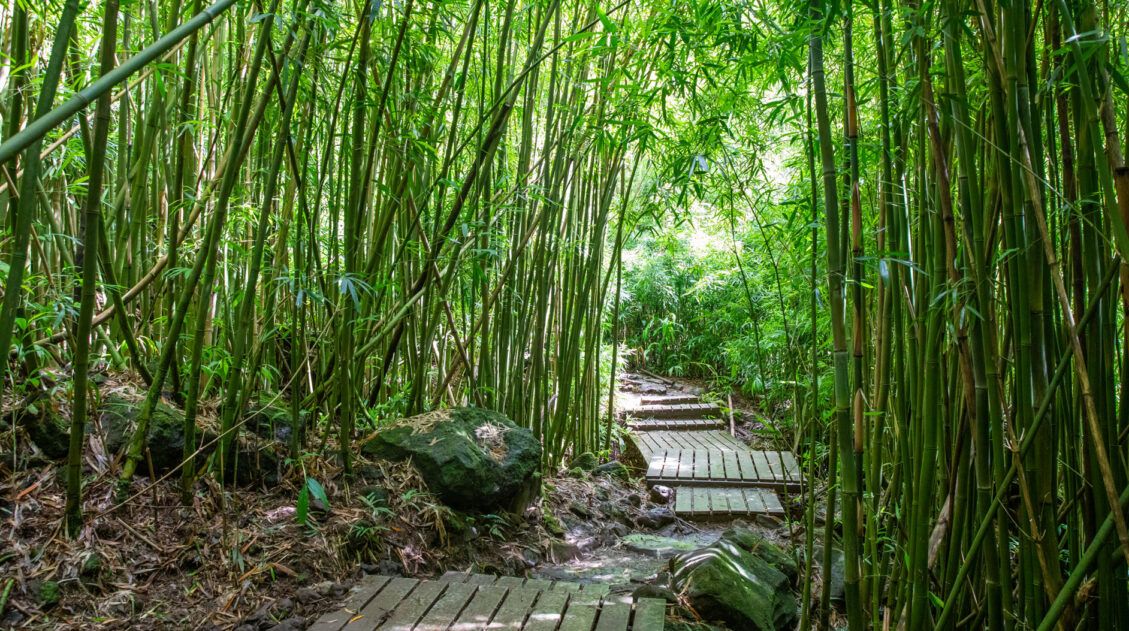
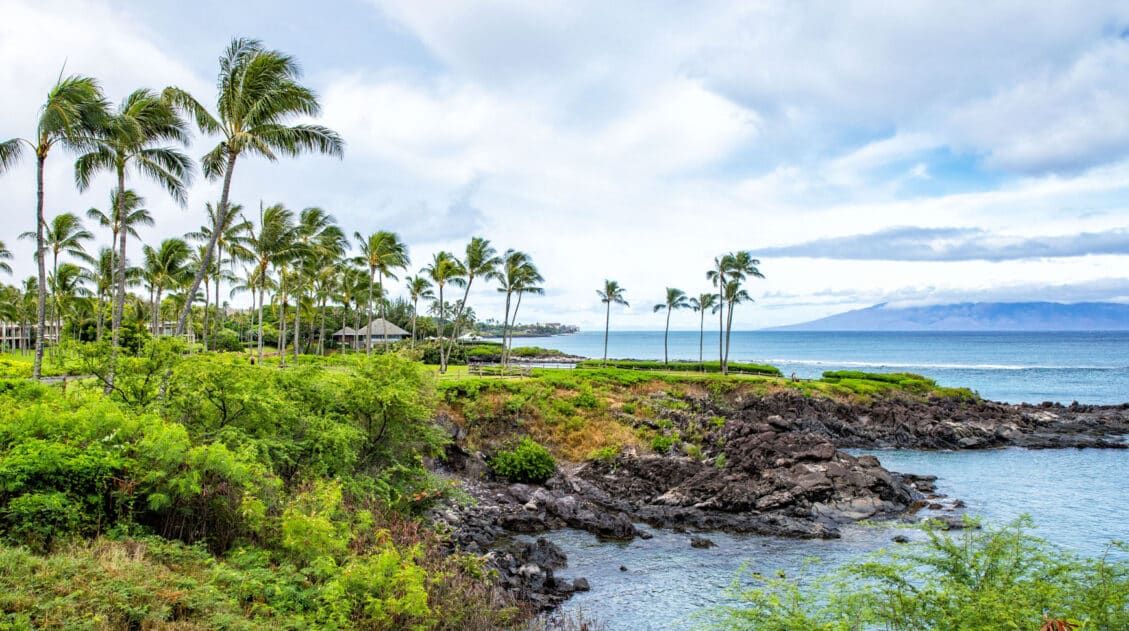
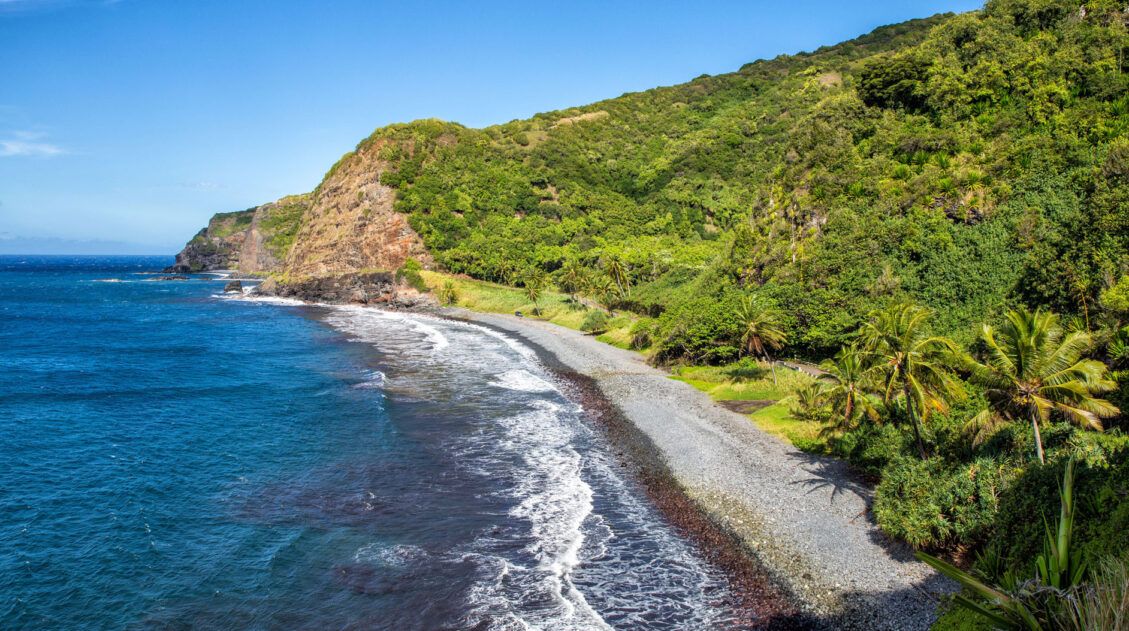
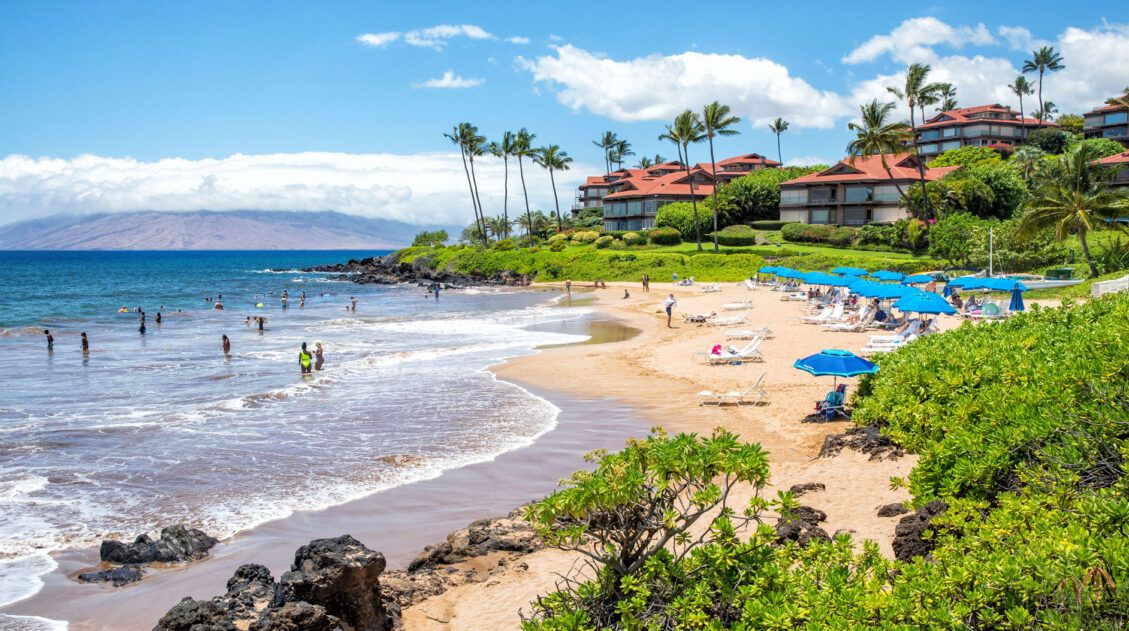
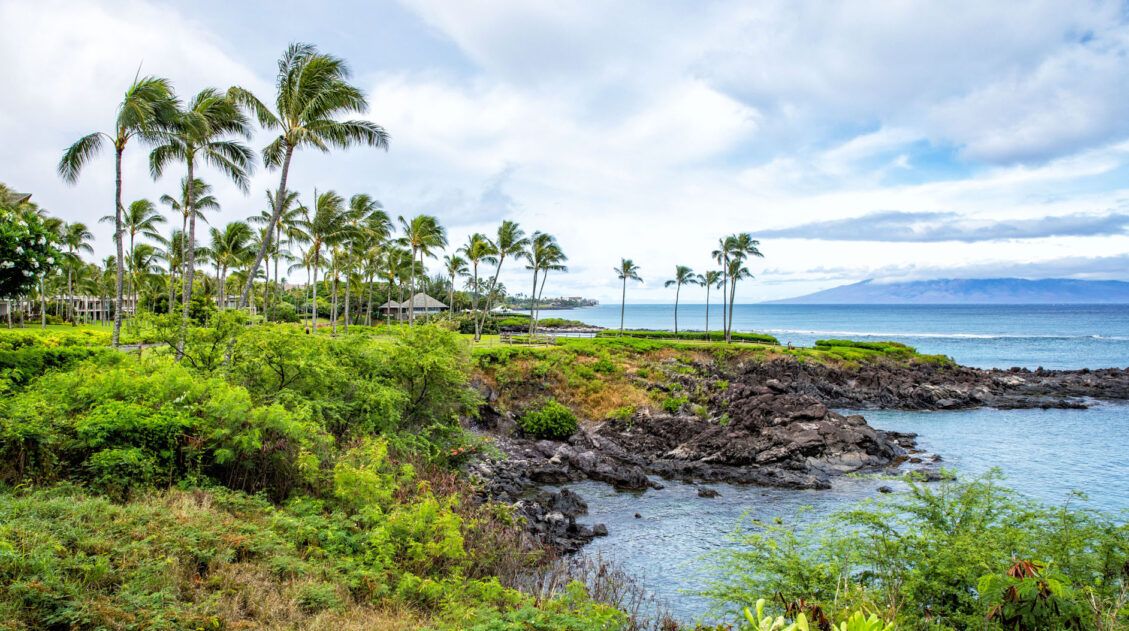
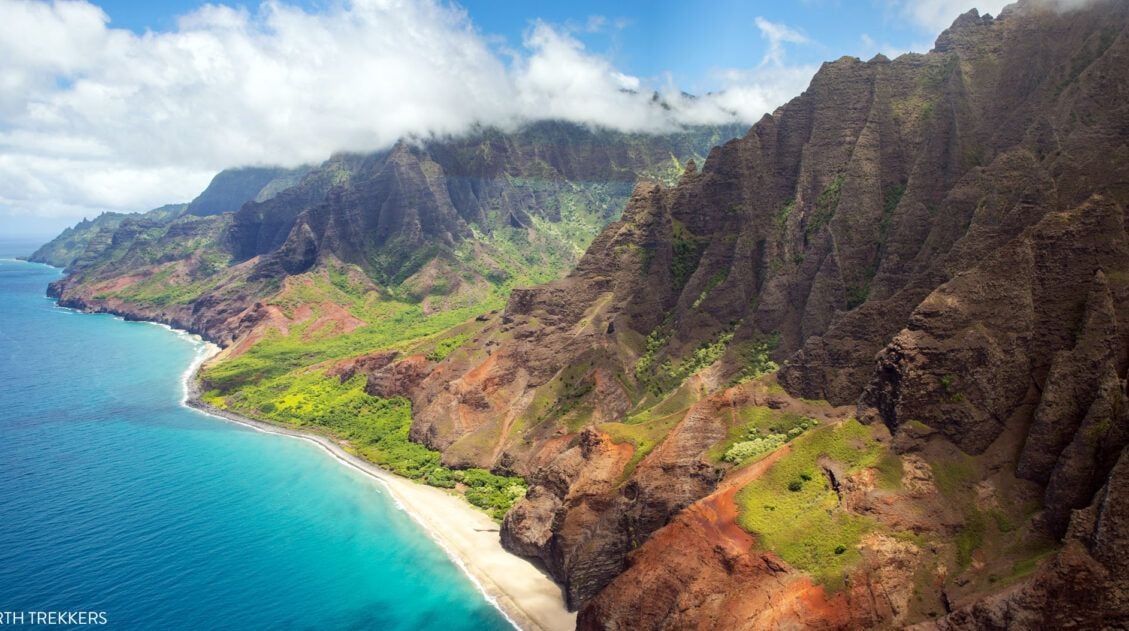
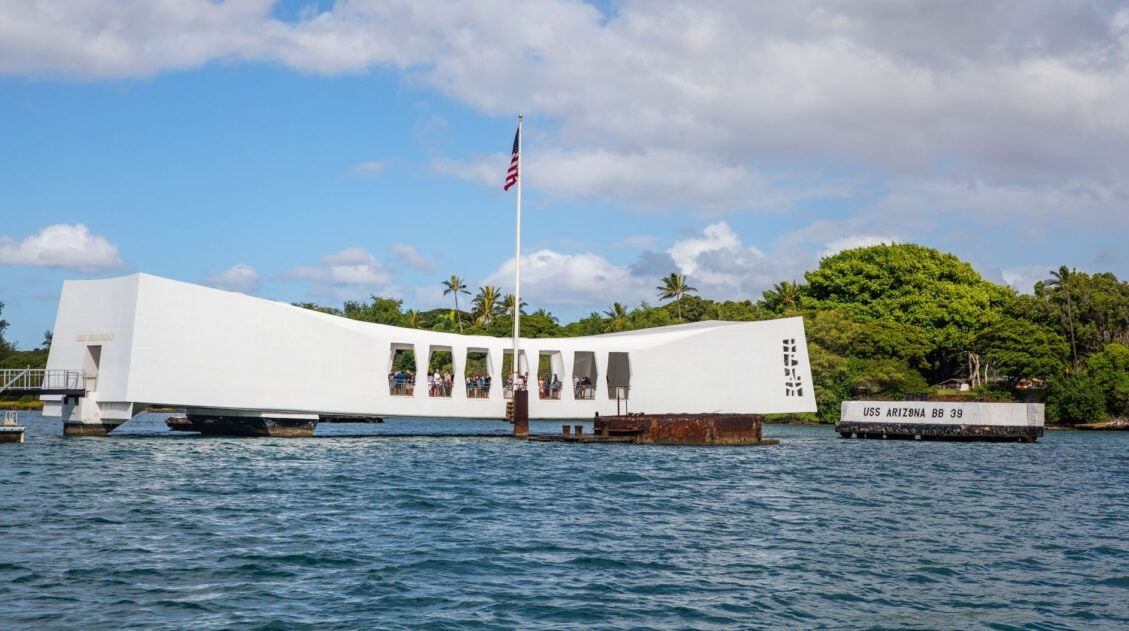
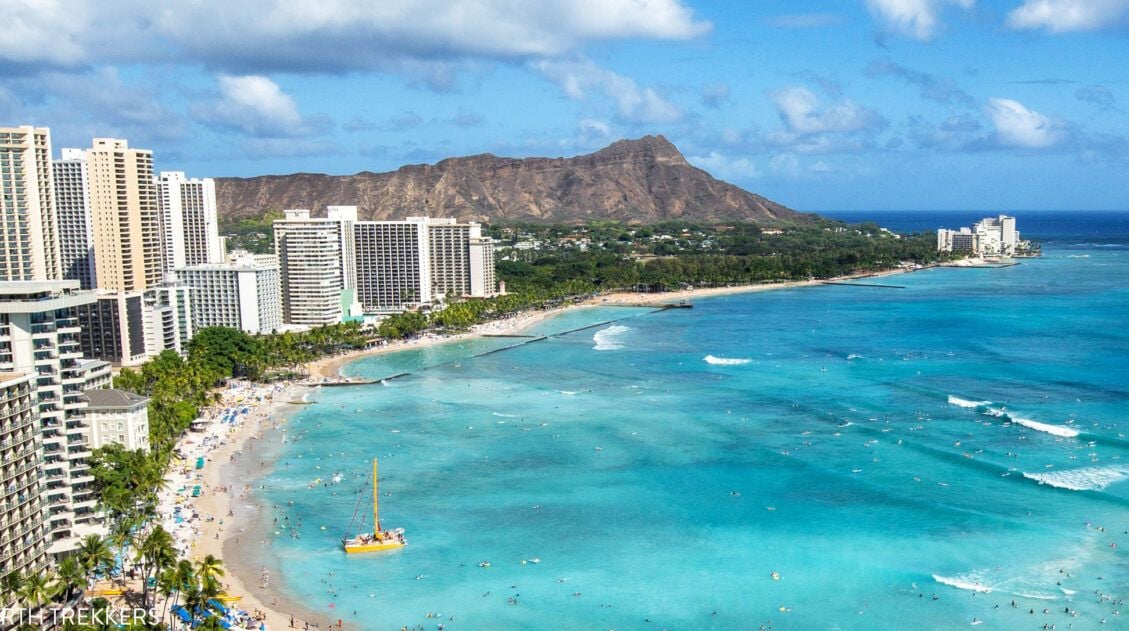
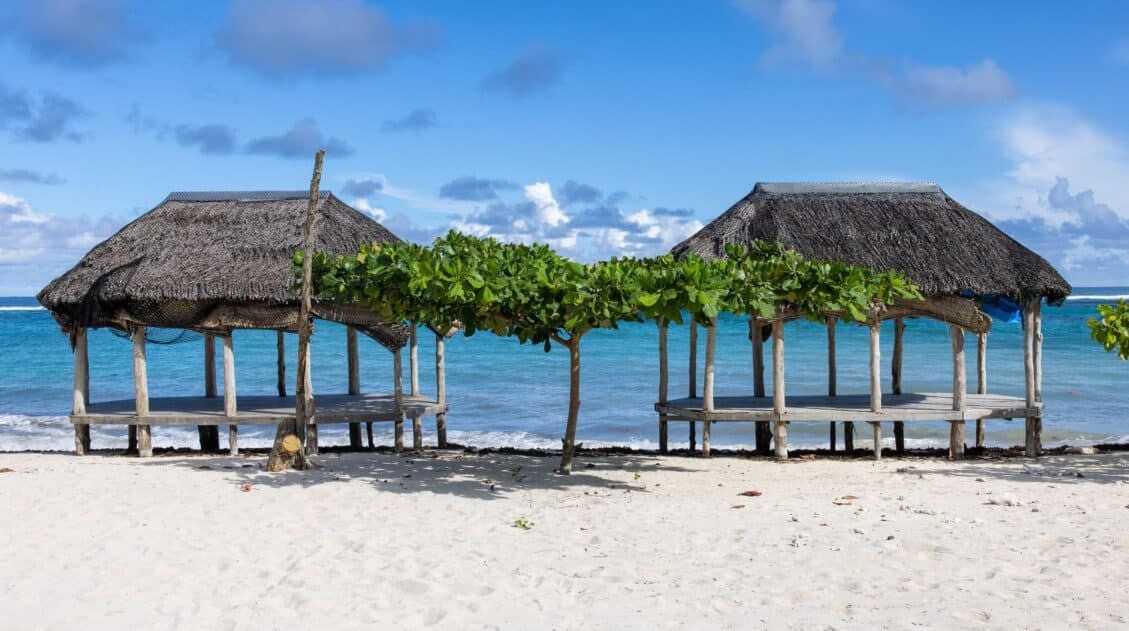
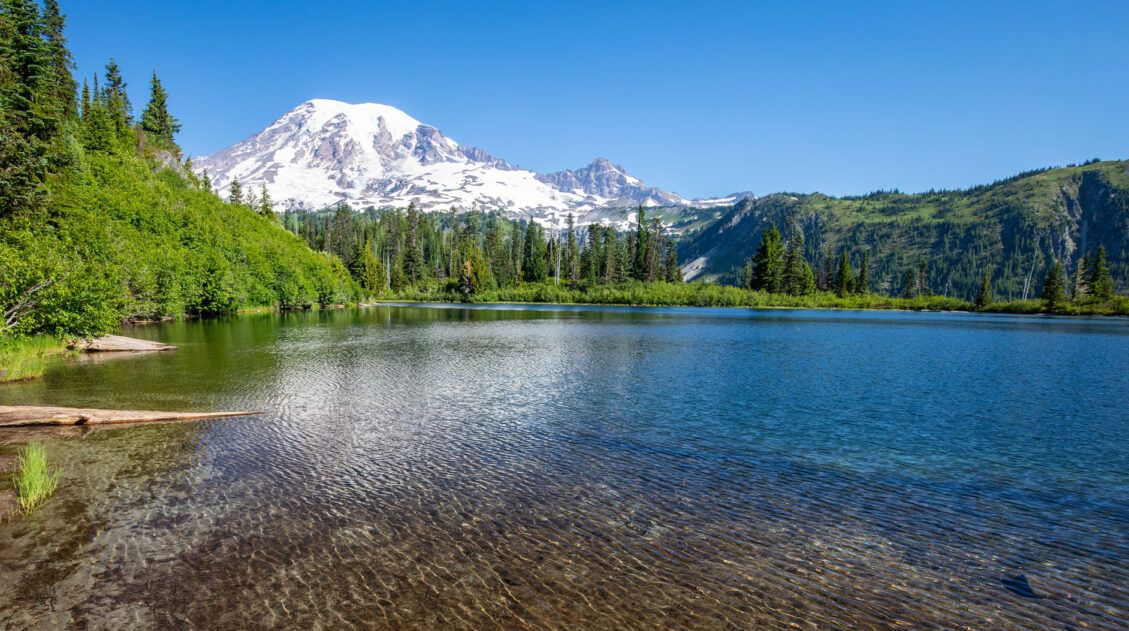
Comments 11